Prior to my expedition, I was put in touch with Lev by a mutual friend. Having driven a Land Cruiser from London to Malawi to be converted into a hospital ambulance a few years previously, Lev very kindly provided me with a heap of useful information for the road ahead along with contact details in various countries should I need them. After the crash, Lev got in touch with further contacts in Nairobi to help me out. I must admit I had no idea he had this plan in the bag, otherwise I would have driven by to say hi en route. Ambitious endeavours like this restore my faith in modern day exploration and I’ve found myself pouring over maps and planning a new adventure of sorts – watch this space…
Congratulations to you Lev – your story has not only showcased your resilience and resourcefulness but has also brought the people of the Nile to the rest of the world.
Lev’s journey was showcased on Channel 4 early in 2015. He is currently [Summer 2015] undertaking his second major walking expedition – I know where he is, but am sworn to secrecy.
UPDATE: LEV, BOSTON AND I ARE RAISING MONEY FOR MATT POWER’S MEMORIAL IN UGANDA. Please help us gather the funds to remember this adventurous journalist who died doing what he loved most. www.gofundme.com/mattpowermemorial
Notes below were taken from Leek News – more photographs can be found on Facebook and Twitter
Captain Lev Wood will walk the Nile
Full Credit and Photos Go to Cheadle and Post Times posted 28 November 2013, Facebook and Twitter
Crocodiles, land mines, malaria and rebel militants are just a few of the dangerous obstacles Captain Levison Wood, (pictured inset), aged 31, of Forsbrook will have to overcome as he attempts to become the first ever recorded person to walk the entire length of the River Nile in Africa over the next 12 months.
Setting off from the mountainous kingdom of Rwanda in Central Africa he will have to walk through impenetrable jungles, the world’s largest swamp in the Sudan and eventually trek into the burning hot deserts of Upper Egypt before reaching the Mediterranean Sea sometime in late 2014.
Captain Wood attended Painsley High school in Cheadle before going onto Nottingham University and then onto the Royal military College at Sandhurst where he trained with Prince Harry.
Following his training he undertook a tour of Afghanistan in 2008 where he served with the elite 3rd Parachute Regiment.
Inspired by his lifelong fascination with Africa and the great explorers such as Livingstone and Stanley his journey of 4250 miles will commence on December 1 and will be filmed for a four part Channel 4 series detailing his experiences and documenting its people and wildlife.
For the majority of the time Levison will be entirely alone apart from any local guide he may employ to assist him navigate unmapped sections of the river.
Testing his physical and mental capacity to the limit he will be travelling on foot with just his backpack through some of Africa’s most extreme, testing and hostile environments.
Encountering the most dangerous animal in Africa, the hippo, he will pass the Mountains of the Moon, and enter the newest country on the planet, South Sudan which has been forged out of decades of civil unrest and war.
Walking along the old slave routes to where Livingstone and Stanley actually met he will travel north into the sands of the Sahara, staying in Bedouin tents before finally reaching the Valley of the Kings and the upper reaches of the Nile delta.
Talking to the Post and Times Levison said, ‘Walking the Nile is not just the most memorable and demanding expedition I’ve ever undertaken, but an amazing opportunity for me to report on all the incredibly positive stories that come out of Africa.
“I know it will not be easy and will push me to the absolute limit. I’m hoping to cover about 100 miles each week but sometimes flooding, detours and just plain losing my way will take it toll. If it does take me longer than twelve months then so be it.
“However despite the inherent risks, I’m looking forward to the challenge.”
Levison has already received messages of support from fellow explorers and adventurers from around the world, including Sir Ranulph Fiennes OBE, the world’s leading modern explorer and Bear Grylls, friend and colleague who said: “Many have attempted his holy grail of expeditions, so I admire Lev’s determination and courage. If anyone can do this I know he can.”
His father, also called Levison Wood senior, aged 60, and his mother Janice said: “Ever since he was a small boy he loved to travel, so it came as no surprise when he left home at eighteen to undertake his first solo trip when he back packed through South Africa to Victoria Falls in Zimbabwe. Finding the Australian outback too tame he crossed into south East Asia through Thailand, Cambodia and on into India before reaching the Himalayas in Nepal.
“Being on his own is nothing new to him as there have been many other solitary adventures, through Russia, Iraq, Iran and Pakistan in the past. He even drove an ambulance once from Blythe Bridge to Malawi with a close friend having raised all the funds to refit and get it there.
“He is so resourceful and resilient. Why even after being locked up by the Turkish police as a suspected spy and held in detention by the Russian army in case he was a Chechen rebel could not deter him from going again. He has received so many good wishes of support from local people in the Moorlands as well as practical help such as insoles for his boots from Clifton Bradley of Sub Four in Cellarhead and clothing from County Attire in Stockport.
“Yes, we certainly worry but he is leading the lifestyle he wishes to follow and in that we have always supported him.”
Being a full time expedition leader, writer and photographer who has now visited almost 90 different countries, his publications surrounding the discovery of rare species of fish in South Sudan and retracing lost routes in northern Afghanistan have led to his election as a Fellow of the Royal Geographical Society in 2011.
As part of this journey Levison hopes to raise funds for several worthy causes including the Tusk Trust, Space for Giants both relating to the survival of the African Elephant, the AMECA Trust which runs a charitable hospital in Malawi and the Army Benevolent ABF, the Soldiers Charity, all of which are very close to his heart.
Rwanda to Tanzania
Full Credit and Photos Go to Cheadle and Post Times posted 9 January 2014, Facebook and Twitter
With one month completed of his epic journey of over 4,250 miles to become the first ever person to walk the entire length of the White River Nile, Captain Levison Wood, aged 31, of Cheadle Road, Forsbrook, has taken time to reflect and recount on the first few weeks of his latest adventure.
While raising money for four of his favourite charities the former paratrooper and Fellow of the Royal Geographical Society said to the Post and Times: “The highlands of Rwanda seem a long way off since we commenced this journey just over four weeks ago.
“We have made excellent progress and managed to stay on schedule covering an average of 100 plus miles each week. Apart from some minor niggling calf strain injuries and some awful wet weather the going has progressed according to plan.”
Accompanied only by a local interpreter and guide ‘Boston’, a self confessed ex-Congolese rebel, plus during the first few days of the walk a Channel 4 film crew, Levison will be ‘alone’ for large parts of the of the time in Africa.
Captain Wood added: “Although I have been to Africa many times before, there are parts of this country that are still recovering from the awful genocide that struck the population in 1994 when over half a million people were murdered in less than three months. “Consequently people are still rightly suspicious of strangers and having Boston explain what we are doing helps tremendously.
“The legacy of those awful times still persists so it is only correct to respect the wishes of the local people to make certain we do not wander into ‘the killing fields’ that surround most villages.
“As we arrive in the latest village we become something of a curiosity and the sight of several dozen smiling faces outside my tent each morning has become routine.
“Even doing the most mundane tasks, such as washing, attracts a great deal of attention.
“Rwanda is an amazingly peaceful and beautiful country and the wildlife is spectacular.
“Watching the chimpanzee troop in the mountain forest and the bird life around the river has been a true privilege.
“Unfortunately the rains have continued unabated throughout December and lasted much longer than usual causing the river to rise and flood the surrounding fields.
“We knew something was wrong when at 2.00 in the morning I saw my bags floating out of my tent. So feeling rather soggy we struggled to rescue our kit and raced to higher ground where we spent a rather damp night being bitten by millions of mosquitoes.
“Nevertheless we got to the capital in Kigali on time to attend a reception at the National Museum where we were shown an amazing exhibit of a 16ft stuffed crocodile which also included a pair of boots that had been found inside its stomach; not perhaps the most tactful thing to show two people who are living alongside “the river Nile for the next twelve months.”
In geographical terms the river snakes its way across Rwanda becoming increasingly wider and deeper providing power resources for most of the country.
The latest venture being undertaken by the Rwandan Government is the Nyaborongo hydro electric dam that Captain Wood was asked to traverse before it opens in two years time.
Still under construction and wet with cement and building materials a tunnel over 1.2 kilometres in length burrows its way beneath the dam through which the river will be channelled next year. Making this route inaccessible thereafter Levison took the opportunity to ‘christen’ the tunnel and in so doing becoming the first person to really walk this part of the Nile.
He said: “I am used to assault courses in the army but nothing like this; it was a real Indiana Jones moment when I finally emerged from the gloom back into daylight, and glad of it.
“Naturally being away from home at Christmas time is difficult. I spent the morning fishing for dinner to accompany a goat we had purchased from our last stop before we entered Tanzania.
“Tasty but not the same as having lunch with my family back home. “Opening a small present my parents gave me of an antique silver match box lifted my spirits and the only thing missing was a pint of beer from the Huntsman in Cheadle.
“And so we enter Tanzania for the next six weeks at least as we head for Lake Victoria.
“The county is far more desolate, wild and rugged with few villages. This will make the going far more difficult as we will have to catch or carry everything we need.
“Wild animals will be our biggest challenge and we will have to build a brush barrier around our campsite each night to keep them out.”
Lions and jackals apart, Captain Wood was also pleased to hear that ‘Animal Planet’ has signed a deal with Channel 4 to beam his progress along the Nile into 94 million homes across the USA in 2015.
The Tanzanian wilderness to Lake Victoria
Full Credit and Photos Go to Cheadle and Post Times posted 29 January 2014, Facebook and Twitter
Robbed twice, hunted by the army and almost no food to be had are just some of the events that have highlighted the second month of former paratrooper Captain Levison Wood’s attempt to become the first recorded person ever to walk the 4250 mile length of the river Nile. Captain Wood, aged 31, of Cheadle Road Forsbrook has recorded his exploits and thoughts and sent them through to the Post and Times for readers to follow.
“The contrast between Tanzania and Rwanda through which we travelled in December could not be greater.
“As we crossed the border, as far as the eye could see, lay a vast remote wilderness of flat savannah scrub land.
The landscape appears like an endless green carpet, devoid of any evidence of habitation and rather daunting to say the least. “So for the next few weeks into the middle of January I shall be finally alone apart from my constant companion Boston, my Ugandan interpreter, ex-Congolese rebel, local guide and general all round ‘Mr Fixer’.
“It is quite impossible to walk alongside the river in this part of Tanzania. Known locally as the Kagera river, there are wide, unbroken stretches of its course shrouded by huge papyrus reed beds, that spread out like a thick constant blanket hugging the riverbank.
“Obliterating any visible man made track way, we are forced to follow the winding, dusty red dirt road that runs parallel to the river.
“The only people we come across walking the same route are heavily armed National Park rangers who have searched and challenged us on several occasions.
“Having warned us about local poaching gangs who roam throughout the district, the two porters who we hired to help carry some of the recording equipment for the journey have decided to take flight and disappeared without a word, taking with them some money and equipment we need along the journey.
“I have decided that Boston’s interview techniques may be lacking somewhat, so next time I shall ask for a CV.
“I thought this only happened in old black and white movies.
“Still the whole incident was made very real when we came across a butchered carcass of an adult male elephant whose tusks had been hacked from its lifeless body lying just metres from the roadside.
“Saddened, shocked and angered by such carnage, our lowered morale was reflected by several miles of stony silence. “Thankfully our spirits soared when during the late afternoon we were rewarded with the majestic sight of a large herd slowly crossing the river as we continued our journey eastward into the darkening shy.
“It seems pitilessly sad that human beings have to sink to such depths and inflict so much pain for so little gain.
“The ivory so cruelly won would be destined for the Far East Asian market where it would fetch a huge price.
“Most of the money however would be taken by the ghost like ‘middle’ men who deal in this vile trade rather than the local poachers who commit these heinous crimes primarily to make ends meet.
“Nevertheless even these men are desperate and will do anything to conceal their tracks and thus we are strongly advised to stay close to the road.
“This was further reinforced by the grim news surrounding the recent murder of a Danish conservation worker who gave their life in the constant struggle to protect the indigenous wildlife in this part of Central Africa.
“Thus being constantly vigilant is now becoming second nature to us.
“Guarding against the perils of nature is an inherent part of any trek throughout Africa, but with the added risk of being shot at or worse, makes lighting a fire and camping at night in the bush seem doubly dangerous.
“The friendliness of the local people we received in Rwanda has also sadly disappeared.
“No longer do we hear the greeting ‘Muzungu’ from the hordes of small children that followed us everywhere, rather the sight of a foreigner in these parts attracts little attention other than some occasional suspicion. In one village we were told in no uncertain terms to ‘get out of town’ by the drunken village headman who accused us of being terrorists.
“No amount of logical explanation would calm down his tirade of ranting so we packed our bags and beat a hasty retreat from the village.
“Unfortunately this forced us to backtrack some 10 miles after completing a full day journeying on the road.
“The only good thing that came out of that particular event was the welcome sight of a shanty bar with the added luxury of a soft but dirty mattress and bucket shower.
“Although I was feeling very frustrated and angered by the enforced extra distance, this was tempered by the emotion of sheer joy when I discovered the blissful opportunity to soak my feet and sip a cold beer.
“Each day we rise with the morning sun and try our best to be on our way before 7am.
“With a usual breakfast of African Chai and stale chapattis, which I spice up with lemon and sugar, in the hope of making them taste like pancakes – much to the locals’ amusement.’
“We have set ourselves a daily target average of anything over 30 kilometres and to achieve the bulk of the distance before a mid day break.
“This then provides us with plenty of rest time after we reach our set destination or close to 4pm whichever is the sooner.
“The endless miles along the dusty roads are tedious and boring, but soon we shall be ever closer to Lake Victoria and the welcome vista of open bush land should reappear soon.
“As the miles drift by and the avenue of limitless banana plantations stretch to the horizon, two figures suddenly appear before us. Describing themselves as the local plain clothes ‘security police’ their presence posed an enormous threat.
“No matter what we said or did would stop them from rifling through our baggage.
“Making the excuse that we had ‘military’ equipment they chose to confiscate yet more of our kit and disappeared back into the safety of the trees as quickly as they had appeared.
“Deciding that we were becoming an obvious target for every local criminal we took ourselves off the highway and into the bush.
“This decision held its own inherent risk, but at least we could disappear off the local radar, at least for a while, or so we thought.
“With food running short and with no villages nearby, Boston was forced to use his catapult to hunt birds for something to eat; pigeon became the staple food, but in one period over three days the only delicacy we had was a half starved sparrow.
“As the options were running shorter than our food, we were forced to make our way back along the main road, only to find our way barred yet again.
“Facing us were half a dozen soldiers brandishing AK47’s belonging to the Tanzania Defence Force making me think that our luck had finally run out.
“They explained that they had been tracking us for days, having been told that a group of foreigners had ‘invaded’ this sensitive borderland with Uganda.
“Realising that we hardly posed a threat of any kind, the tension disappeared, happy to leave with the exchange of some ‘dollars’ for food.
“The exorbitant over inflated price didn’t matter, because we were within a day of our target destination and glad to have something to eat. Doubling our pace we almost ran the last few miles.
“Finally the welcome destination of Bukoba came into view and the thought of a soft bed for two nights lifted our spirits.
“The town lies near to lake Victoria, named by the explorer John Hanning Speke in 1858 and at the point where the river empties its waters into the muddy vastness of the lake. My imagination wandered back in time to this hero of my boyhood who spent many fruitless years trying to discover the source of the Nile and wondered what he might have said given that’s where I had just come from. But that’s another story, another month and yet another country; Uganda.”
‘Northern Hemisphere at last!’
Full Credit and Photos Go to Cheadle and Post Times posted 28 February 2014, Facebook and Twitter
In the latest installment of Captain Levison Wood’s journey across the River Nile, just two weeks into the New Year Captain Wood, aged 31, of Cheadle Road, Forsbrook, found himself crossing the Tanzanian /Ugandan border well in advance of his planned arrival.
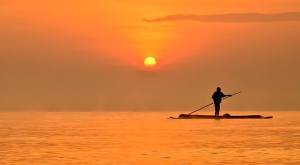
A stand-up rafting fisherman paddles along Lake Victoria in Uganda at sunset. (Tom McShane Photography)
HOPING to become the first ever recorded person to walk the entire 4250 mile length of the river Nile, the former paratrooper explained that his progress had been much quicker than anticipated and the 600 plus miles he had already covered from the start in Rwanda in early December far exceeded his expectations.
Detailing his intentions and providing information from his diary to the Post & Times he said: “My journey is much more than just becoming the first person ever to complete the expedition.
“Rather I want to show people another picture of Africa, one which portrays positive images rather than the constant tale of famine, civil strife and problems being faced by these most resilient people.
“Yes it’s true they have to contend with making a living under the most trying circumstances, yet somehow they manage and remain the most generous and warm hearted people you could ever wish to meet.”
Levison is walking with his local interpreter Boston during this initial stage of his journey through central Africa.
Originating from the Congo Boston, who now resides with his family in Uganda, is a self confessed rebel fighter who was forced to flee from his homeland. He is also a man Lev has come to rely upon.
Unable to continue beyond these borders because of tribal reasons, this quietly spoken young man has been a constant companion over the last few weeks, ever present to advise and able to ward off dangers from local threats.
He will be sadly missed when the Ugandan leg of the journey is completed.
Captain Wood continues in his diary: “My first experience of Uganda is one of great warmth and welcome.
“Thanks to a very positive article in the national newspaper ‘The Monitor’ we have been greeted by a huge crowd lining the road into the village of Kasanero, which could be called a fishing village, but that phrase has connotations of a small, traditional community with a long-established way of life. Around the shores of Lake Victoria settlements like this are more often known as ‘landing sites’.
“The fish that are landed here are Nile Perch, although they are named for the river they are not native species.
“Their introduction to the lake is widely regarded as disastrous, both in human and environmental terms.”
“Lake Victoria is a vast lake, almost a freshwater inland sea about half the size of England; over aeons it had developed a unique ecology.
“However, as East Africa developed in the colonial and post-colonial era, some saw it as an under-used, or under-exploited, resource.
“Thus in the 1950s it was hoped that the introduction of the Nile Perch would create a new fishing industry.
“Growing to almost two metres long, the Nile Perch are brutal-looking predators.
“Their appearance reflects their nature, and their arrival in Lake Victoria was catastrophic for the indigenous species of fish.
“With no natural controls on their numbers they colonised the lake with astonishing speed.
“They ate everything, destroying species after species (many of their victims had been unique to the lake and for them, eradication meant extinction).
“But the introduction of the perch was still seen as a success by many.
“The hoped-for fishing industry proved a reality and grew quickly.
“‘Landing sites’ such as Kasansero sprung up around the lake, boomtowns for a business that offered great rewards; people flocked to share in the comparative affluence made possible by catching the Nile Perch.
“These predominately male settlements became an opportunity for prostitution, which flourished.
“Thirty years ago, people started falling ill in Kasansero and nobody knew the cause.
“The people here called the disease “slim” because of the shocking weight loss most sufferers experienced before dying. “The world had not heard of HIV/AIDS, but in Kasansero its effects became more apparent every day; hundreds died.
“Today, infection rates remain extremely high, and the settlement is saddled with the reputation of being the site from where AIDS originated in Uganda.”
While in the village Levison was invited to attend a local wedding and not having appropriate attire he took himself off to the local market place and bedecked himself out in the latest fashion which would challenge the style gurus for ‘the modern explorer look’.
Looking extremely dapper he quipped: “I’ve never had a suit before that was shinier than my shoes.”
He added: “We had a great evening and an amazing experience which I will fondly recall for the rest of my life.”
Following a pleasant break from their daily routine of marching, the pair found themselves back on the trail once morel.
Heading at last northward along the lake side, they passed through huge mangrove swamps and energy sapping soft sandy mudflats.
Just a few days short of the capital city of Kampala, and taking the opportunity to swim and soak his aching feet and associated blisters in the cool waters offered next to his campsite, he was surprised to see local villagers frantically waving their arms and trying to attract his attention.
Responding to their calls of alarm he saw them struggling with a 6 metre (19ft) long python snake they had just dragged from the waters close to where he had been swimming. Thankfully he said; “That particular day the walk had taken longer than usual so it seemed as though St Christopher had been smiling down on them both.”
With their goal of Kampala almost in sight they crossed the significant milestone of the equator and entered the northern hemisphere, where in traditional manner they made a wish and sank a few bottles, knowing that everything from hereon was technically downhill.
They were also joined by a local news crew from Ugandan NTV who undertook a live interview which brought out the crowds once again as they entered the suburbs.
Levison said: “I was overwhelmed by the large number of people who turned up simply to shake our hands.
“A group of local bikers even rode beside us and gave us a cavalcade right into the heart of the city.”
Several TV interviews have since followed including a visit to meet with a local witch doctor to treat their aches and pains. With a break of several days in the planning but a heavy schedule of filming with Channel 4 still to undertake, Levison will not have time to put his feet up before he is on the road once more.
With a list that includes a bout of boxing with the Ugandan National Champion, river rafting and a meeting with a King, the next few days will be a whirlwind.
For Boston, he can take some time out to meet with his wife and children prior to meeting up for his final leg of the venture in Uganda.
Apes and Monkeys
Full Credit and Photos Go to Cheadle Times posted 5 April 2014, Facebook and Twitter
With over 700 miles of his epic journey already under his belt to walk the entire 4250 miles of the River Nile, Captain Levison Wood, aged 31, of Cheadle Road, Forsbrook, felt it was a good time to take a few days off and take advantage of a generous offer made by the Ugandan Government to visit the Mountain gorilla sanctuary in the western part of the country. Accompanied by a two man film crew from Channel 4 who are recording this leg of his journey and flew to the Bwindi National Park. The former paratrooper has sent the Post & Times his personal notes from his diary for readers to enjoy.
DAY 66-69 – Jinja is a mini paradise amid the hustle and bustle of central Uganda. It’s also one of the tourist hotspots and for good reason.
Visitors flock to see the ‘Source of the White Nile’ and also to get stuck in to some white water rafting on the famous rapids. I, on the other hand have spent the last week trying to put weight back on by eating lots of food that isn’t goat.
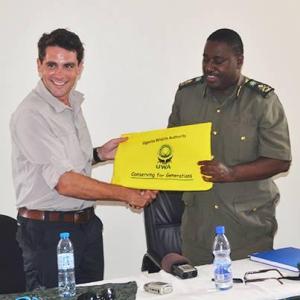
Lev gets the go ahead from UWA to visit the Bwindi Impenetrable Forest to see the mountain gorillas.
I have also been very privileged to be invited by the Head of the Uganda Wildlife Authority to visit the Bwindi Impenetrable National Park in the west of the country to see the magnificent mountain gorillas, of which there are only 800 left in the wild. So I have decided to strayed from the river for three days and set off in search of these magical animals.
We had a very early departure from the ranger station very soon after the safety brief given by UWA Ranger Richard: ‘Do not go closer than seven metres and never look the male ‘Silverback’ gorillas in the eyes and whatever happens, don’t run.’
Bwindi Impenetrable National Park lives up to its name. Thick tropical rainforest emerged out of the mist and in the distance can be seen the huge volcanoes that dominate and line the horizon, that forms the frontier with the Congo.
The park itself is only accessible by foot and this proved to be a challenge as we weaved through the forest.
The tension was as thick as the damp air and could have been cut with a knife as every sound from the undergrowth elicited a nervous halt.
Continuously on guard and reminiscent of my time in Afghanistan, I looked around, half expecting a man-sized ape to jump out of the nearest tree at us.
After 45 minutes of cutting through the bush we were on the verge of giving up hope, but Richard assured us that we would find gorillas and sure enough we did.
In a small clearing by a stream, the bushes appeared alive with movement. “Over there” said our grinning guide, clearly loving his job.
Walking ever closer towards where Richard was pointing, we almost stepped on a well camouflaged gorilla nestling in the thick foliage, who made his presence known only with a ‘couldn’t care less’ low grunt; so much for the seven metre rule. The ape did not seem in the least bit bothered by our presence. After finding this male, another suddenly walked across our path, less than two metres away.
Before we knew it we were surrounded by an entire family of at least fifteen gorillas all sitting and munching on leaves.
Suddenly a young woman who had paid the 500 dollar per day permit to join our group let out a high pitched shriek which dramatically broke the calm.
In response a large black-back male charged at our ranger at an amazing speed, waving his arms and screaming. Richard responded by turning on his heels and dived back into our company, so much for not running.
The angry male then stopped as suddenly as he started.
The ashen faced Richard stated rather unconvincingly, ‘They are usually mock charges.’
With a look of relief and a heart racing like a train I responded, ‘Thank goodness.’
It was an exhilarating and humbling moment. We spent an all too short memorable hour with the gorilla group before leaving them in peace. It was an experience I’ll never forget.
Day 70-72 – I left the city of Jinja after a morning of administration following a week off walking. Walked 20km from Jinja to Busowoko Falls following the west bank of the White Nile.
Covered 27km pushing it hard through the country tracks. There are villages all around and we are followed everywhere by curious school children. Staying in a village hut tonight at a place called Namusaala.’
We are following the banks of the Nile which is now almost a mile wide at this point and the temperature is getting noticeably warmer the further north I walk. I have been joined by my friend Ash Bhardwaj now that the film crew have left. It’s his first time in Africa and he’s loving it. We have been allowed to camp on the river bank on a cattle farm tonight.
Day 73-74 – We pushed on through acres of sugar plantations where once savannah grassland was found only a couple of years ago. Now it’s a scene of total devastation as fires burn the remaining bush.
By the roadside we come across two small children playing with a tiny baby Vervet monkey which they had clearly taken from its mother.
With no other course of action I decided to rescue the monkey and try and locate its family, after sitting quietly and trying to induce the troop of Vervets to reappear and claim their offspring it became clear that the interference by the children and the nearby fires had scared them from the area.
Sadly the number of children present increased and saw my efforts as a game.
Having waited over for over an hour to see if the mother would reappear I came to the conclusion that the children who had constantly chased the monkeys had caused her to abandoned the baby.
With no other choice I decided to adopt the little Vervet and take it to a sanctuary.
At the first opportunity I phoned my home in the UK to ask my mother how to look after my new companion as she had previous experience of working with Vervets in South Africa. So thus with purchased baby milk I’ve been continuously feeding it through a bottle and giving it mashed banana throughout the night.
The following day wrapped in a blanket and tied to my chest the newly christened ‘Florence’, who is less than a week old, joins our walk northwards.
With a baby monkey in tow we proceed north from Baale pushing a hard 32km mainly along a track that parallels the Victoria Nile. Most of the walk I had to deal with her chewing on my earlobe.
Vervet monkeys are very social animals, often in troops ranging between 10 and 50.
The babies in particular begin interacting from a very young age and develop strong social bonds which are known to last for life.
It is no wonder that Florence has become attached. Florence did well and coped with the bumpy and hot walk admirably. I sorted her out with a new home after a good deal of calling around. We arranged for a transport to take her to Jinja where she will be collected by the Uganda Wildlife Education Centre based in Entebbe.’
Vervet Monkeys, primarily found in Eastern Africa are often seen as pests and killed.
They are also trapped for traditional medicine, bush meat, and for biomedical research.
Their biggest threat however appears to be loss of their natural habitat.
Fortunately upon our arrival in Baale I manage to locate an animal sanctuary that is willing to take this poor orphaned creature.
Organisations such as the Ugandan Wildlife Education Centre provide a safe haven for orphaned or injured Vervets as well as other wildlife.
It’s strange how you can become attached so very quickly but her survival is paramount and so with a very heavy heart I pay for a taxi to take her to her new home and family. After seeing Florence safely off to Entebbe, now slightly behind track the team carry on towards Lake Kyoga.
Tragedy mars Captain Lev Wood’s River Nile Expedition
Full Credit and Photos Go to Cheadle Times posted 13 April 2014, Facebook and Twitter
An expedition across the River Nile by a Forsbrook adventurer has been marred by tragedy after the sudden death of a journalist who was accompanying him on part of the journey.
Captain Levison Wood, aged 31, of Forsbrook, is currently part way through his challenge to become the first ever recorded person to walk the entire length of the River Nile in Africa over the next 12 months.
While in Uganda, American Freelance travel journalist Matthew Power, who had joined Lev and his team for a week of travelling and reporting on the expedition for Men’s Journal, died after falling ill suddenly.
Speaking about the tragic turn of events Lev said: “We are all shocked and saddened by the tragic news of journalist Matthew Power’s death while covering the expedition for Men’s Journal magazine.
“Our thoughts and condolences go out to his family and his colleagues at this time.”
Paying tribute to Mr Power, Men’s Journal has posted the following article online and on the Walking The Nile Facebook page: “For more than a decade Matthew Power has been packing a bag, and finding a way to some far-flung, often unpleasant place, to report quintessential Men’s Journal stories – the climbing disaster on K2, the explorer walking the Amazon, the reckless fireworks displays in Tultepec, Mexico, to name just a few – and write them with an understated grace and clarity that most writers can only hope to achieve.
“Matt was on assignment for Men’s Journal in Uganda – “a classic MJ story” is how he pitched it – accompanying a British explorer, named Levison Wood, while he attempted to walk the length of the Nile.
“Matt was only dropping in and walking with him for a week, but you got the sense that he’d trudge on as long as it took to get the story and to understand the man he was walking with.
“Matt fell ill, lost consciousness, and died a few hours later.
“His travel companions believe the cause of death was heatstroke, but we won’t know more until an autopsy is completed.
“No writer better represented, or loved, Men’s Journal as well and as fully as Matt did and we are proud to have published his work whenever we could.
“He was a true adventurer and a principled, ethical journalist who never failed to put the accuracy of the story and the fairness in his depiction of a person, place, or situation above what worked for him as a writer.
“Matt chose the hard way when it was the right way, yet somehow never failed to enjoy the journey.
“He was 39-years-old and he will be greatly missed by us here at Men’s Journal and his many friends and colleagues around the world.”
[There is a great article written about Matthew Power written by Business Week – what a top bloke, read about him here.]
UPDATE: LEV, BOSTON AND I ARE RAISING MONEY FOR MATT POWER’S MEMORIAL IN UGANDA. Please help us gather the funds to remember this adventurous journalist who died doing what he loved most. www.gofundme.com/mattpowermemorial
In the footsteps of Bogey and Hemingway
Full Credit and Photos Go to Cheadle Times posted 13 April 2014, Facebook and Twitter
WITH almost 1,000 miles completed during the first three months of Captain Levison Wood’s, epic journey to become the first recorded person ever to walk the entire 4,250 miles from source to sea the time has come to assess the story so far.
The former paratrooper, aged 31, of Cheadle Road, Forsbrook, has maintained a magnificent pace of averaging 100 plus miles each week since his start in the Rwandan Highlands at the beginning of December 2013.
Since then he has crossed two further countries in Tanzania and Uganda and now is just a short walk away from crossing the border into the recent trouble spot of South Sudan.
Having encountered at first hand the heartbreak of seeing the results of elephant and rhino poaching he has become more determined than ever to complete his journey and raise money for the four charities he is supporting by the walk. Space for Giants and the Tusk Trust head this list but he also raising money for a Children’s Hospital in Malawi (Ameca Trust) and for his former comrades in Arms through the Army Benevolent Fund.
If only people fully appreciated how desperate the plight of these animals are in.
Within the next ten years the entire wild herd of elephants across the African continent will no longer exist if the amount of poached ivory being exported to the Far East is allowed to continue.
There are only eight white rhino left in the wild which means extinction before the end of this year.
The journey has also had its highlights however and Levison can report that the Vervet baby monkey he rescued and described in his report to the newspaper is doing extremely well and putting on weight.
Although the course of action he took is not the one he would have chosen for baby Samuel, at least he will have a chance for long term survival and in the fullness of time be able to join an adult troop and be released back into the wild.
In the meantime the journey has taken Captain Wood and his constant companion Boston into the northern wilds of Uganda, travelling into the ‘Lake District’ where the White Nile meanders through mile after mile of dense reed swamp.
Here is his latest diary entries: –
Day 78 to 79 – Masindi Hotel: “Before we venture into the far north of Uganda, where local supplies are short I take the opportunity to stay in the last soft bed for the next two months at the Hotel Masindi.
“The hotel is in many ways is a relic of the colonial era and dates from a lost bygone age.
“Ernest Hemingway’s faded black and white photograph looks down on visitors entering the hotel; the writer beaming as he cradles the head of a dead lion he has shot.
“Thank goodness that times and attitudes have changed.
Hemingway author of ‘A Farewell to Arm’s, Pullitzer Prize winner and ‘The Old Man and the Sea’, in fact spent quite a lot of time in and around the hotel following two near fatal airplane crashes on the nearby airfield and who spent many weeks recovering from his injuries in this hotel.
“For a while the press had even reported that he had died along with his wife.
“Audrey Hepburn and Humphrey Bogart also stayed at the hotel whilst they were shooting the 1951 adventure film ‘The African Queen’.
“Bogart went on to win his only Oscar for his performance. of the old crusty sailor Charlie Allnut.
“He was the only member of cast and crew to avoid illness during the shoot and credited his good fortune to avoiding water and sticking purely to whiskey.”
Day 80-81: “A hard day’s walk through forest terrain north of Masindi port.
“Vast areas of the bush have been burnt down for cattle grazing, but it’s still pretty wild.
“Local herdsmen guide us through the maze of scrub and give me a lesson in spear throwing.
“It is common to see grassland burnt for cattle grazing; nearly 85 percent of Ugandans live in rural areas and derive their livelihood from agriculture.
“Burning back the bush clears away undergrowth that makes cattle-farming harder and allows more grassland to develop. “Sadly, the effect on native wildlife is disastrous.
“Walking from Kampala to Masindi, Lev and the team have entered the kingdom of Bunyoro-Kitara in western Uganda.
“This kingdom is the second largest of all the Ugandan kingdoms and, similarly to Buganda, Bunyoro-Kitara was once a powerful kingdom before colonialism.
“Up until the early twentieth century Masindi was a popular port town and a well-used docking station for steamboats, once a prominent mode of transport on the Nile.
“However since the decline in steamboats the town’s size and trade has significantly decreased. This area is very remote and the people, the Bunyoro, are suspicious of foreigners.
“There are rumours here that foreigners, particularly white ones, kidnap locals to eat.
“Eventually found a guy willing to trust us, we didn’t eat him.”
Day 82 – Into the wild: “Had our first sight of Ugandan elephants just at the side of the road. Things are starting to get wild now.
“Another epic 36 km push north to Karuma Falls where the spectacular rapids filled the air with noise.
“The river is narrow here and this is the start of the Murchison Falls National Park.
“Karuma Falls is a popular tourist attraction in Uganda.
“It is on the eastern border of Murchison Falls National Park is a structure of rocks at the bottom of the river that forms a series of water falls.
“Karuma takes its name from a great spirit in local folklore, who individually positioned the stones to break the waters of the Nile.
Day 83 and 84 – The Wildlife of Murchison:”We spent the morning buying supplies in Karuma before heading into the wilderness of Murchison Falls National Park. Met by rangers from the Uganda wildlife Authority and set off crossing the bridge over the Nile.
“Almost immediately the landscape changed from farmland and burned bush to pristine savannah forest, thick and untamed.
“Evidence of wildlife isn’t that far away saw elephant dung everywhere and at the banks of the river was confronted by ten hippos.
“Also saw a bush buck, a giraffe, an antelope and a herd of noisy buffalo. This is probably the wildest adventure of the expedition yet and there’s another week of this to go.
“Murchison Falls National Park, also known as Kabarega National Park is Uganda’s biggest nature reserve and home to a wealth of rare and endangered wildlife.
“Spreading inland from the northern shores of Lake Albert it is named after the Murchison Falls waterfall.
“We walked 20km through the bush on the north bank of the Nile and found snares and other evidence of poachers.
“The river is still turbulent and full of hippos, no crocodiles or elephants seen yet though.
“The trees are full of black and white colobus monkeys.
“Tonight we are camping on the banks of the river and listening to the water splashing against the rocks, beneath an ink black star lit sky.”
Sunset over Lake Albert
Full Credit and Photos Go to Cheadle Times posted 3 May 2014, Facebook and Twitter
Following the recent, sad and tragic death of American travel journalist Matthew Power who was reporting upon Captain Levison Wood’s attempt to become the first person to walk the River Nile in Africa, the news released from the expedition has been respectfully muted.
The former 31-year-old paratrooper from Cheadle Road in Forsbrook was devastated by the events that occurred in northern Uganda and decided to take several days break from his record breaking 4,250 mile walk to consider his own thoughts.
As everyone would expect the local authorities had to complete the formalities associated with the event before providing Levison with the necessary clearance and permission to return to his trek.
This they did within three days.
With additional confirmation from Matthew’s family that they wanted the expedition to continue, Captain Wood has recently resumed the odyssey northwards along with his constant companion and local guide interpreter Boston.
Travelling ever northwards and following the White Albertine Nile the mood of the journey was inevitably sombre and has been mirrored by the dark brooding clouds that have accompanied the walkers.
March in this part of central Africa heralds the dreaded forthcoming coming ‘rainy season’.
With the Sudd swamp awaiting Levison just across the border in South Sudan the already perilous route will only get longer if the rains come early and engulf vast swathes of the river bank.
The following report of the journey has been extracted from his diary:
Day 94 – The road to Obongi
As the Nile flows from Murchison Falls towards the far northern shores of Lake Albert the reed filled river banks are becoming wider and choked with vegetation.
It is far greener here and less hilly as the Nile widens, making the walking a little easier.
The humidity is slightly less intense and thankfully not so oppressive as it was back in the National Park surrounding Murchison Falls.
The number of people we meet in the countryside has increased markedly and everywhere we go it appears that they have heard of our progress and greet us with a warm smile.
In one of the many small villages which hug the shoreline we come across a medium-sized antelope called a duiker tied to a post.
Sadly wild animals like this are often hunted in Central Africa as bushmeat, even though they are a protected species.
After discussing the merits of rescuing this poor creature with Boston, we decide to confiscate the animal by contacting the local Rangers who arrive quite promptly and take the antelope away to the National Park.
Deciding that we may not be too popular with the local people we push on with an additional spring in our heels and cover the 31 kilometres to Obangi by mid afternoon.
A welcome, warm beer follows, accompanied by the usual daily meal of rice and goat which completes the day as we watch the most amazing sunset overlooking the lake.
The part of the river Nile region is home to a vast number of local tribes, all of whom have been very hospitable.
Aside from the Lugbara and Alur tribes the others are considered ethnic minorities in Uganda owing to their low population numbers. Many of these tribes are referred to as Nilotic peoples or Nilotes as they speak Nilotic languages common with groups inhabiting the Nile Valley, and parts of Central and East Africa.
The Nilotes also form the majority of the population in South Sudan which is the next country on our list to cross. Sadly as Boston does not belong to one of these tribes his progress northwards with me will be halted and I shall have to venture on alone.
Day 95 – Achioli to Adjumani
It’s hard to imagine that the last leg in Uganda is drawing to a close as we cover the 34km across the hills of Achioli land after crossing the Nile again to the east bank. The weather has got noticeably cooler and the foreboding of the dark clouds shrouding the distant hills to the south forecasts the rainy season is approaching and not too far away.
The next couple of months will be characterised by heavy downpours of rain during the late afternoon with May being the wettest month of the season and could if unduly heavy bring the whole expedition to a premature close.
With a swamp the size of England just ahead in South Sudan, the Sudd must be navigated before the rains arrive.
With these worrying thoughts filling the mind it’s easy not to see the beauty of this place. The small circular huts that dot the landscape are easily missed and it’s not until late in the day that hunger gets the better of us and we decide to stop and buy a meal in our final town in Uganda. Adjumani.
Michelin star restaurants are not abundant in this part of Africa even though this is the largest town we have stopped in since Kampala.
I dream of taking Sunday lunch back home with my parents in Forsbrook.
What I wouldn’t give for a roast beef and ‘yorkshire pud’ dinner.
Instead we settle for the local Ugandan equivalent of ‘Fricassee of saute’d bush rat’.
Even with my eyes closed, the more than palatable peanut sauce could not rescue the charcoal black, rubbery skin and skinny meat that lay lifeless in the bowl – Masterchef it was not.
South Sudan…Jiggers and the Mundari Tribe
Full Credit and Photos Go to Cheadle Times posted 10 May 2014, Facebook and Twitter
After weeks in Uganda, Lev and his companion guide Boston crossed the border into South Sudan at the small border town of Nimule.
Since Captain Wood commenced his epic journey in December 2013 to become the first recorded person to walk the river Nile from its source in Rwanda, he has already covered over 1,200 miles and navigated through three central African countries.
Having endured being robbed and hunted by poachers, suffered near starvation and the tragic sadness of a colleagues death, South Sudan will without doubt pose even greater problems for him to overcome in the coming weeks.
The country is the newest political entity in the world, having only come into being in July 2011, when it gained independence from its northern counterpart.
It was hoped that as a result of its establishment, the outcome would end one of Africa’s longest and bitterest civil conflicts. Two tribes however have thrown the country into chaos with both plying to usurp the other and cast their dominance over the political landscape of the country.
The Dinka tribe who hold power of government and the Neur who live primarily in the north east of the country, have taken up an armed insurgent struggle to protect their land, they claim from cattle rustling and ethic cleansing
Unfortunately since December 2013 the country has seen renewed violence between the warring parties resulting in thousands of people fleeing their homes and seeking refuge in camps along South Sudan’s border or in neighbouring countries like Uganda. With the river Nile running along the border between the tribal lands claimed by both groups the safety issues that Captain Wood will face are obvious, yet the perilous situation is made more difficult by the natural geography of the country. For just beyond the capital city Juba lies the obstacle of the Sudd swamp.
A vast natural region, which can expand to the size of England if the seasonal rains due in May come earlier than expected. So time is of the essence and any delay could mitigate an early end to the journey in its present format.
Levison has sent along the following extracts from his diary to illustrate his concerns, hopes and fears for the next part of his expedition.
Day119 South Sudan Border – “As we crossed the border we were forced to leave the riverside due to lack of available food and unreliable porters and so we took the main Nimule-to-Juba road.
“It is reasonably paved in parts and fast going but leaving the road has now become impossible because of landmines found on either side of the highway. There are warning signs everywhere and the further north we walk we come across representatives of the UN trying to destroy them.
“The day is horribly wet and it would appear that the rains are here with a vengeance now.
“Although we have covered a fair distance, the miles are long and I fear the worst. By nightfall as we reach a village on the southern outskirts of Juba my troublesome right foot is becoming irritable and starting to cause some concern. Removing my sock the reason became apparent and was immediately diagnosed by part time ‘Dr’ Boston.
“He pronounced the pain was being caused by ‘Jiggers’ a small burrowing worm that lays an egg beneath your toenail, which in turn starts to grow.
“Explaining that I probably picked up this parasite when we camped beside Lake Albert, he suggested that a small operation was in order.
“So taking a new razor blade from its packet he starts to slice off small slithers of skin from the end of my big toe.
“A tiny brown dot was the only visible sign of the predicament, yet as he dug deeper it grew larger until the grub appeared.
“Squeezing out the head first and then the white body, until the maggot that lay beneath finally popped from beneath my skin.
“Grateful for what he had done I learned a valuable lesson that day having told me with great relief that if left untreated the condition could become fatal.”
Day 122-124; Staying with the Mundari Tribe – “Taking a break from the endless walking towards the city we decide to investigate a nearby local clan of people and stay for two days with a migrating group of Mundari cattle keepers.
“For hundreds of years the tribes of South Sudan have treasured cattle as their primary form of wealth- often being used for trade, barter and as a marriage dowry.
“The people are naturally warm and generous to guests and reluctant to alter their traditional lifestyle.
“With great sadness they explain to me that outside forces are constantly stirring up trouble and trying to recruit their young men into the militias that roam this part of the country.
“In recent years I have been to this part of Africa several times and it is clear that the situation has greatly deteriorated and I feel for these wonderful people and the pressure they are under.
“Whilst settling down to an evening meal with the headman, he offers to induct me into becoming a member of their tribe. “Considering this to be a great honour, I accept with gratitude, my eagerness only being tempered by the wry grin that spreads slowly across Boston’s face.

A crowd gathered and started warming up for the big moment. That’s right. It was time to get ready to rumble. (Tom McShane Photography)
“Apart from being stripped to the waste they begin by washing my shaggy uncut hair in a strong smelling water that turns out to be indoctrinated cow urine.
“I can tell by the reaction of the men surrounding the campfire that this is causing some amusement but having come this far the head massage that follows is a welcome treat.
“Upon completion I am pronounced the latest member of the Mundari and given an unpronounceable baptismal name. “Feeling rather proud of my new status I stand amongst my brothers who take my hand and welcome me with long undulating shakes that continue for minutes.
“Only after the initiation ceremony is complete do I wonder why they are staring at my head my hair has turned bright red. Now I realise why Boston was so amused.”
The Battle of Bor, South Sudan
Full Credit and Photos Go to Cheadle Times posted 1 June 2014, Facebook and Twitter
Leaving Juba the capital city of South Sudan on his journey along the river Nile, Captain Levison Wood, aged 31, of Cheadle Road in Forbrook is attempting to become the first recorded person ever to walk the entire 4,250 miles from its source in Rwanda to the Mediterranean Sea in Egypt. Since his epic trek began in December 2013 he has already passed through several countries and has experienced many trials along the way, yet nothing could have prepared him for his encounter that was to take place just a few miles north of the city. Walking with his local translator and guide Boston, the adventurers have become committed friends with both being determined to reach and face their greatest challenge to date the Sudd swamp. Sadly events have a way of taking over and plans do not always come to fruition.The following extracts are taken directly from Captain Wood’s personal diary.
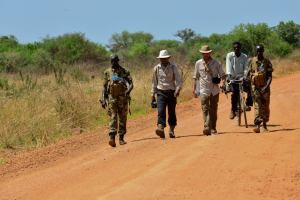
Lev and Boston walk with SPLA officers and a porter on the road North from Juba heading towards Terekeka.
(Tom McShane Photography)
Day 132 Monday 14th – Wednesday 16th April 2014
“The morning started rather normally as we commenced our daily 30 kilometre journey with the sun rising slowly over the unusually quiet suburbs of Juba.
“Accompanied by an early morning mist the road weaved its way through a maze of shacks that lined the highway as we headed into the northern bush.
“It became quickly apparent that all the motorised vehicles driving along the road were all heading south into the city and similarly the few pedestrians we also encountered that lined either side the highway were all walking towards us.
“Considering that this might be the usual morning commute with people heading into work or simply going to market day we did not think this was in anyway unusual.
“However as the day grew towards noon and the temperature reached the high 30s, the steady stream of passers by quickly multiplied into a torrent of bedraggled stragglers.
“Entire families shuffled along the road carrying all manner of household goods with even the tiniest child struggling to carry bags of clothing or a pot and pan.
“Most were extremely dirty from days on the road and as the numbers increased the large numbers of people were almost exclusively women and small children.
“For the first time on our walk through Africa nobody appeared to show any interest in our progress through the throng.
“Rather they appeared to be walking blind and in a daze to their surroundings, being far too busy escaping their recent past by constantly urging their children to hurry along.
“They were clearly refugees from renewed fighting and heading to camps located in the south of the country.
“The long dusty road continued to snake through village after village and the number of countless burnt out lorries littering the highway increases the further we progress to Bor.
“They bare testimony to the recent conflict in the district and it is difficult to judge just how long these blackened hulks had been there as this is a very common sight in many African countries.
“But as the numerous skeletons of abandoned vehicles had not yet undergone the usual scavenging that instantly occurs when vehicles are left unattended I half suspect the damage had been caused during the last few days. These are worrying signs of things to come.
“So after some discussion we decided to push on and find a quiet spot away from the road and set up camp.
“Luckily I have brought food from Juba as there is nothing to be had or found in the usual multitude of roadside shacks that lie deserted and empty along the highway.
“Locating our daily meal usually involves haggling over a goat or chicken and can be easily found in a roadside shop. “Tomorrow however is going to be much harder as we can manage without food for a day or two but no clean bottled water presents a much bigger problem.
“As night falls an eerie silence falls over the countryside and a sense of foreboding pervades the humid air.
“Rather than attract any attention we decide not to light a fire and settle down to a restless night waiting for the sun to come up.”
Day 135 Thursday 17th April
“Having walked into a war zone I can’t stop my mind drifting back to my time in Helmand province with 3 Para during my tour to Afghanistan in 2008.
“With options running out we decide for better or worse to stick to our initial plan, stay positive and push on towards the UN compound in the small northern town of Bor.
“The signs of widespread looting and devastation are to be seen in every street and alleyway, damaged buildings and discarded personal belongings clutter the ruins, yet by far the most awful thing is the sweet but acrid smell that hangs heavily everywhere.
“The few people we see soon head for cover the moment they glimpse our arrival and with that any chance of purchasing food for a meal diminish to zero.
“Thoughts of the logistical challenge surrounding the crossing of the Sudd swamp occupy my mind and the disappointing conclusion that without the necessary support and backup we cannot continue the trek any further.
“To make matters worse the Sudd must be achieved before the heavy seasonal rains fall in May, so time is running out and any further delay could seriously jeopardise the whole course of the expedition.
“As the day wears on each weary step we take seems increasing heavy and made progressively worse when our progress is constantly checked every mile or so by roadblocks of government backed soldiers.
“Having to explain our cause time and time again seems to make no difference to these fatigue clad figures that appear from nowhere.
“Demanding our papers and the usual administrative fee that usually enables progress, our pace is slowed to a crawl.
“After years of adventurous travel my naturally cautious nature in situations like this is becoming increasingly troubled by the obvious unease that is apparent across Boston’s face.
“Being of Dinka extraction he is clearly worried by the prospect of meeting members of the ethnic Nuer tribe who are opposing the Government in this part of the country.
“For the first time since we started the journey together I begin to doubt the purpose of the undertaking and after having lost my colleague Matt Power recently in Uganda the whole enterprise is certainly not worth another life.
“That evening, as we rest beside an army check point I make the difficult decision to send Boston home to his wife.
“I make the resolve that this trip is my risk and mine alone and so with a heavy heart I tell him that he cannot continue with me any further.
Day 136 Friday 17th April
“A very emotional start to the morning watching Boston climb onto the back of a truck before beginning his homeward bound journey heading back to Juba and thence to his family in Kampala.
“He has been my friend and constant companion for the past four and a half months.
“His final wave signals yet another low point of our shared journey; how different this is to the laughter and joy we enjoyed together while passing through Uganda.
“I shall miss his warmth and quietly spoken manner. I am alone.
“As I approach the first signs of Bor town I am stopped yet again by another army patrol who after some explanation of my situation escort me into town under an armed guard, a rather sullen, muted figure brandishing an AK47 slung from his hip.
“Taking the opportunity to witness the complete collapse of any form of civilisation, we wander through the ghostly streets until we reach the deserted market square, where the once thriving businesses now lie abandoned in shattered and burnt out ruins.
“Suddenly the silence that perpetuates the town is abruptly broken as we hear gunshots in the distance.
“From my previous experience I estimate that the sounds could not have come from more than 300 or so metres away.
“And with that grave warning my ‘watcher’ and I retrace our steps through the maze of streets back towards the checkpoint.
“Taking shelter in the only remaining building on the outskirts of town, the soldiers inform me that there are gangs of youths roaming throughout the area shooting anyone they can find.
“The passage to the UN compound is inaccessible and for my own sake they advise me to stay put and await the outcome.
“That night from my refuge that becomes my hotel, I witness ‘all hell breaking loose’.
“Throughout the dark hours there is constant shooting, red glowing tracers dart through the trees, machine guns chatter away and fires light up the sky.
“I discover later that I have observed an assault upon the very compound where I was intending to stay.
“Who was actually doing the shooting is rather confusing as both sides claim the other were responsible. The outcome however remains unaltered.
“I hear that two United States helicopters hoping to evacuate civilians had been badly shot up with four soldiers being wounded, one seriously, two Indian peacekeepers had been killed and over 60 innocent civilians massacred.
“Saddened by the plight of the poor victims of this soulless, murderous war and without any chance of continuing my journey, I decide to return to Juba, glad in the knowledge that Boston was not with me to witness the carnage that was Bor.
Saying Goodbye to Boston
Full Credit and Photos Go to Cheadle Times posted 7 June 2014, Facebook and Twitter
Over the last few months Captain Levison Wood, aged 31, of Cheadle Road, Forsbrook, has been undertaking a record breaking walk along the 4250 mile length of the River Nile with his local interpreter and guide Boston.
Throughout this time they have shared many adventures together which have been reported in this paper.
With great sadness their time together has come to a close and we share Levison’s thoughts recorded in his diary. Starting the journey at the source of the Nile, Rwanda.
“Boston and I had been travelling together for four and a half months.
“Day in, day out we had never been further than a few metres apart – something which I can’t say about any other person in my life.
“His quietly spoken manner and endless warm smile has made the trip shorter by many miles.
“Proffering advice when asked, I always knew I had someone covering my back in times of danger.
“Boston had seen me angry, sad, hungry, elated, exhausted, stripped of my dignity and most of the time downright bloody filthy.
“We’d been through swamp, savannah, city and jungle together.

Saying Goodbye to Boston
“For me, the prospect of heading off into the wilderness alone was daunting, if not terrifying, but I’d begun this expedition alone and had to see it through…”
“Negotiated and navigated some of the toughest terrain I’ve ever been through.
“He’d become more than a guide and constant walking companion. He’d become a friend.
“Boston looked after me when times were tough, woken me up on more than one occasion when we were running late and needed to get walking – when that was the last thing I wanted to do – and had been a brilliant guide.
“But as his period on the expedition was drawing to a close, the time had come for us to go our separate ways and say goodbye.
“Boston had never been to Sudan and doesn’t speak Arabic. “Furthermore I was heading into a war zone and I didn’t want to take responsibility for his safety, especially since he’s got a wife and two small children to consider.
“It’s one thing taking risks yourself but I couldn’t ask him to come with me onto the front line, even though he desperately wanted to.
“There’s no easy way to disappoint someone so I told him my decision in Terrekeka in South Sudan not long after we crossed the border.
“In some respects the decision had already been made for me as his South Sudanese visa was about to expire and he couldn’t get a visa for the Republic of Sudan without going back to Kampala in Uganda anyway.
“He was so upset and told me that above anything else he wanted to finish the expedition and see the pyramids in Egypt, his childhood dream.
“Although he was badly disappointed he choked back the tears I could see welling in his eyes and accepted the inevitable. “We spent an emotional night reminiscing about our adventures, we laughed and cried about the scrapes we had got ourselves into and the countless memories that we will share for the rest of our lives.
“Like a chapter closing in a book the end came quickly.
“The very next day he boarded a lorry travelling south and he was gone.
“I made sure he got back okay and we’ve been keeping in close contact ever since his departure.
“For me, the prospect of heading off into the wilderness alone was daunting, if not terrifying, but I’d begun this expedition alone and I had to see it through.
“I was now at the mercy of fate and everything the expedition was capable of throwing at me.
“From now on the journey would be an entirely different beast.
“I knew I’d miss Boston, his tales of misadventure from the Congo as a rebel leader, his history of Africa from an African’s eyes, his wildly inaccurate conspiracy theories and not to mention, his dead eye pigeon hunting.
“For sure I’ll miss his enthusiasm and zest for new experiences, he’s not a bad cook either (although he uses way too much salt!) but I am happy to know he’s safe at home and that we will be friends for life. I have no doubt I’ll see him again very soon.
“So God’s speed my friend. You occupy a big place in my heart. Until next time.”
Disappointment and Resolution
Full Credit and Photos Go to Cheadle Times posted 19 June 2014, Facebook and Twitter
Readers of this column who have been following the epic trek of Captain Levison Wood, aged 31, of Cheadle Road, Forsbrook, in his attempt to become the first man to walk the entire 4,250 miles of the river Nile from Rwanda in central Africa to Egypt will have learnt of the heartbreaking decision to abandon part of the walk because of fighting in the country of South Sudan. This was recently reported by this newspaper in the episode titled ‘The Battle of Bor’. Further to that extract taken from his diary, Levison has further explained his decision by detailing a far more graphic explanation of what took place.
Day 134 – South Sudan: Too Close – “Upon our arrival in Bor I knew I was in a war zone
“Soldiers, policemen and armed civilians flooded the muddy streets.
“I was immediately apprehended and arrested by a heavily armed ‘soldier’ and taken to a compound that resembled a scene out of an eighties film set.
“I was immediately surrounded by gun toting men in every kind and colour of camouflage uniform, each wearing berets of all colours, shapes and sizes.
“Taken before the governor’s representatives, who were sitting under a tamarind tree in the state compound, the local commander told me politely, but in no uncertain terms that now was not a good time to be in Bor and my presence was not welcome in the town.
“Stating that, ‘Local armed youths were storming the UN base nearby, to which I had been heading, and they were still monitoring the outcome of the attack, as it was still in progress!’ He made it absolutely clear that he would not give me permission to continue with the expedition north.
“The town itself has been destroyed by the war. In the outskirts, entire villages had been burnt to the ground, looted and abandoned.
“Destroyed tanks littered the side of the road like rusting hulks and the smell of death and decay is everywhere.
“Mass graves had been the only way to bury those killed, and a weeping lay preacher showed me where 17 members of the clergy had been murdered inside his beloved cathedral – now only a shell of a stone and wooden structure riddled by bullet holes and charred by fire.
“Ruined and destroyed, the once busy market place stood silent and empty, burnt to the ground by rebels in January.
“The banks that surrounded the square were ghosts of their former selves, scarred with shattered glass and pot marked by gunfire.
“An ATM machine hung like an eyeball out of its socket on the outside wall. Inside credit cards, cheque books and filed accounts were strewn across the floor.
“Rebels and government soldiers alike had used the banks date stamps to plaster the walls with evidence of their pillage, in a twisted sense of humour.
“Messages of defiance adorned the walls and pillars were scrawled with graffiti illustrated how the town had changed hands four times.
“After taking some respite in the charred remnants of the South Sudan hotel, where all the doors had been smashed open, lights smashed, I discovered for myself later the truth of the situation.
“At dusk with the light fading, I witnessed at first hand the battle of Bor.
“The sky was suddenly lit up by tracer fire, heavy machine guns rattled in the streets and the dull thump of mortar rounds shook the ground.
“A large mob of Dinka youths were shooting into the besieged UN compound, supposedly in retaliation for the Nuer celebrating the fall of the town of Bentiu in the north of the country which had fallen back under rebel control.
“Reports that later emerged from the fire fight detailed around sixty people had been shot and hacked to death during the attack.
“UN peacekeepers were forced to return fire and the battle swept backwards and forwards throughout the long night, leaving the wounded and dying in the streets.
“It was plainly obvious that any attempt to continue my journey further north would be foolish and stupid.
“My two nights in that hellish place was enough for me.
“I heard that the rebel fighters were staging a massive offensive on the key towns which straddle the Nile – Bentiu, Malakal and Renk to the north of Bor, all of which were part of my journey following the Nile.
“During the following days battles raged around these towns and certainly hundreds, possibly thousands, were reported killed.
“Walking this part of the Nile in peacetime is difficult enough as I would have to navigate around the 400 miles of the world’s largest swampland, the Sudd and at the same time carry enough food to last for three weeks.
“Add to that the scheduled, rainy season which begins during May which only adds to its size.
“These difficulties would have posed a sufficient challenge in itself.
“I would have faced these problems gladly and was prepared to accept what nature had in store.
“However the additional burden of dodging bullets without any logistical assurance of any food or water beyond the swampland made the task just impossible.
“Deciding that it would be foolhardy and reckless to try to walk through the middle of a war zone, in which people are starving and dying, I made the heart wrenching decision to fly from Juba to North Sudan and continue my journey from there.
“While I won’t be able to walk this stretch of the Nile I will carry on with the expedition on the other side of the war zone – and one day, in more peaceful times, come back and fill in the gap.
“I’m obviously very disappointed but it’s the right decision, for many reasons and ultimately out of my hands.
“I only wish now for peace in South Sudan and hope that people can get on with their lives.”
Levison’s family who live in Forsbrook said: “We know how disappointed he must be having taken this decision.
“He has spent over three years in planning the expedition and having already hitchhiked and served on several front lines from Afghanistan to Iraq and has been to a multitude of dangerous locations such as Colombia, Burma, Iran, Syria and Palestine.
“We know that he would never have taken this course lightly and covering the distance would present no problem what so ever.
“Our hearts go out to him and we only wish we could stretch across the sea and give him a big hug and tell him that everything’s Ok.
“Naturally we are so grateful that he is safe and back on the trail but we know one day he will return and complete the journey, that’s just the way he is.”
Various Ships along the Nile
Full Credit and Photos Go to Cheadle Times posted 27 June 2014, Facebook and Twitter
Following the recent traumatic events endured by Captain Levison Wood, aged 32, of Cheadle Road, Forsbrook, that forced him to abandon part of his walk along the river Nile in South Sudan, he overcame his great disappointment by continuing his journey northwards to become the first ever recorded person to walk the entire 4,250 mile length of the river from source to sea.
Although many would have abandoned the challenge at the point where he stared death in the face, instead he took stock of what he had already achieved and made his stoic decision to carry on.
Arriving at a point just beyond the fighting that is still continuing throughout the country Captain Wood recommenced his walk on the border with its northern neighbour Sudan.
The following story is taken from Levison’s own journal detailing his latest adventures.
Day 143-147 – “The difference between South Sudan and its northern neighbour – and former master – the Sudan couldn’t be more striking.
“While South Sudan is green, lush, wet and not too dissimilar to northern Uganda, there is in Sudan a stark transition to the seemingly lifeless terrain of the desert.
“Here the panorama is brown and sand creeps into everything.
“Christianity and traditional African beliefs are the most common religion in South Sudan, whereas by entering the Sudan, I have now entered the religious realm of Islam.
“The daily call to prayer sounds out five times a day, minarets protrude from the skyline and, most of the men I have seen are wearing dazzling white jallabiyas, whilst the women wear colourful hijabs.
“After the violence and instability of the South, entering Sudan has been a welcome change and relief.
“No fighting here – only overwhelming hospitality and friendliness.
“Getting over the disappointment of the last few weeks has been somewhat tempered by the sudden change in atmosphere.
“Everywhere I go I’m offered tea and food and have been welcomed freely into houses.
“It has brought a new dimension to the expedition and I’m looking forward to reaching Khartoum and crossing the Sahara.
“I am joined on my journey by my new translator and local guide Moez.
“Our first day together begins in a small village called Kosti when at 7am we begin our walk to avoid the ferocious midday heat.
“However it’s unavoidable – by 9am it’s over 40 degrees and the going is tough.
“We’ve bought bicycles to push so we can carry enough water.
“I’d like to say I was tempted to ride it but the thing is a cheap Chinese knock off and the pedals and seat keep falling off.
“They are proving to be more trouble than they are worth.
“My new travelling companion is an ardent photographer and stops to take more pictures than I do, yet we are getting along extremely well.
“Sadly like my former colleague Boston, Moez is suffering from the effects of walking in the sand and has some amazing blisters on his feet so we will need to consider limiting the miles we do each day, at least to begin with.
“My own two feet resemble hard leather strips after covering almost 1800 miles so I have no problems at the minute.
“The landscape has changed from scrubland to a flat horizon of khaki coloured sand, devoid of plant life.
“Wooden huts that intermittently line the rough road that runs alongside the river have been replaced with Adobe mud compounds.
“The people are amazing with Sudanese hospitality living up to expectations.
“Everywhere I go I am warmly welcomed and invited into homes for refreshing mint tea and food.”
Days 148-150 – “The bikes lasted all of 2 days. We got so fed up pushing them through sand and having bits fall off I’ve traded them in for 2 donkeys which seems a far preferable option.
“We have given them two Arabic names as it seemed appropriate, Kej and Azamak.
“They carry our supplies and water grudgingly it would appear and no matter how we coax them along they seem to have minds of their own.
“With Moez’ blisters still causing him problems our progress along the eastern side of the Nile is agonisingly slow, particularly as our two new four legged companions seem very unwilling to move when the sun blazes down from above.
“Everything is dry, dusty and hot and so we are forced to take a long break during the early afternoon until the donkeys are of a mind to walk again.
“I just wonder who is in charge now.
“In a magical episode, as we were walking through the village of Um Ganaim I met an old hajji who said his grandfather was given the actual spear that killed General Gordon.
“He said that it was his grandfather’s cousin who made the fatal thrust before the British Victorian hero was decapitated in Khartoum.
“The old man, named Mohammed Ismail Abu Garja then proceeded to fetch the spear.
“It’s too far-fetched to be false and just the kind of serendipity that the Nile can produce in the places you’d least expect it.
“After seven days of walking we have finally arrived in Ad Douiem where there is an impressive bridge that spans the mile wide Nile at this point.
“Having been extremely gentle with Kej and Azamak over the last two days, they have repaid our misplaced kindness by doing a runner when we were just about to start the next leg of our journey.
“Given that normally they could hardly muster a slow walk when asked, yet suddenly and without warning they turned into Derby contenders as they bolted in the totally wrong direction.
“Reminiscent of a scene from a silent Laurel and Hardy movie we chased these laughing beasts for nearly a mile before catching up with them.
“I decided then that they were as useless as the bicycles and they had to go.
“So at the end of the day we arrived at our next stop which was a garage forecourt.
“Hardly four star luxury but we hired a sprung bedstead each and put our feet up to negotiate our next mode of transport.
“Seeing that Moez was beginning to really struggle with the walk I purchased in part exchange one larger donkey with a cart and said goodbye to Kej and Azamak.
Sea of Sand
Full Credit and Photos Go to Cheadle Times posted 2 July 2014, Facebook and Twitter
With the problems of South Sudan now well behind him, Captain Levison Wood, aged 32 of Cheadle Road, Forsbrook, is back on track to complete his 4250 mile epic journey to walk the length of the River Nile in Africa.
Travelling forever north, not only has the landscape changed dramatically but so has the weather.
The damp, humid, energy sapping conditions which Levison has become so familiar with since the start of the journey have now altered to being even hotter yet much drier as he enters the desert wastelands of Sudan.
With mid day temperatures in excess of 40c, the daily trek is broken into two halves. Beginning at sunup Levison and his co walker, guide and translator Moez commence their journey until around 10am and again late in the afternoon till sundown.
Access to drinking water is essential for the expedition to succeed and the need to carry in excess of 12 litres per person for each day has forced Levison to enlist a variety of modes of transport in the form of donkeys and camels to carry their supplies.
The two intrepid explorers think nothing of covering 30k each day, while filming their progress for a forthcoming Channel 4 series to be shown later this year.
Levison has sent to this newspaper the following extracts taken from his expedition diary for readers to enjoy his recent exploits.
Day 151 – Sudan: Groundhog Day
“Today marks five months on the road and I am now over halfway through the expedition having covered almost 2500 miles.
“The weeks on the road are starting to merge together into a sort of continual blur, where faces appear to be the same and so do some of the places.
“The journey which still remains amazing has already taken on so many different dimensions that the new challenges we will face in the Sudan no longer appear that daunting.
“The threat of rain has finally passed and the most annoying issue at the moment are rogue scorpions which find their way into my boots with some regularity.
“Checking my rapidly wearing footwear for stinging hitchhikers is becoming a frequent morning routine.
“The biggest challenges we are due to face are now most definitely physical.
“Exertion in the extreme heat and the mental drain of passing through an unchanging, lifeless landscape is a mind numbing experience which can cause you to fall asleep even whilst walking.
“Taking your eyes from a safe route through the desert can lead the unsuspecting traveller into pools of hidden quicksand which tragically can be fatal. It is wise to stay alert.
“Tonight as usual, Moez and I are camped out under the stars, but this particular evening we have found a bed in the forecourt of a petrol station.
“The early part of the evening is spent resting our aching limbs on a string bed whiler listening to the gentle symphony produced by the humming sound of diesel generators somewhere in the distant darkness.
“He tells me over mint tea that things will become more interesting north of Khartoum and promises dinosaur fossils, prehistoric rock art as well as gold mines.
“Being a Nubian and proud of his culture our conversation turns to the building of dams on the Nile, which he believes will destroy his country and its people.
“On a more mundane note our latest donkey, James Augustus Grant, appears to be holding out reasonably well, but less so than the cart he pulls which managed to get two flat tyres today. “This meant a long, endless, heavy haul for five miles to nearest repair shop where we take this welcome break.” Day 153: Sudanese Birthday
“As we arrive in yet another unpronounceable Sudanese village, I spot what looks like an internet café, so taking the opportunity to phone my family back in Forsbrook I find with joy an immediate connection and someone at home.
“The familiar and welcome voices of my mother and father wish me a ‘Happy Birthday’ over the crackling line.
“Telling me that it’s raining back home, my thoughts turn to the green fields that line Cheadle Road and the distant hills that surround Dilhorne.
“With their recently arrived present of some new walking socks my day is almost complete, for this is the driest birthday I’ve had since I was at school at Painsley High and I’m not just referring to the landscape.
“Sudan’s Sharia Law means that there’s no alcohol over here, so my unforgettable 32nd birthday party involved some sweet chai, a donkey and the (very long) Sudanese version of Happy Birthday played on a drum by my trusty guide, Moez. Eid milad sa’aid to me.”
Day 158 – Sudan: Sandstorms & Camels
“We finally arrived into Khartoum after 12 days walking from the border, and were greeted by a blinding sandstorm that blasts through your clothes.
“My dream of encountering the confluence of the Blue and White Nile came and went with some disappointment, as I have to say there’s not much difference in colour.
“Khartoum is the largest Sudanese city with an estimated population of over five million people.
“It is actually three cities built into one, with the sub city of “Omdurman placed where the two rivers meet.
“The city is very busy, litter strewn and although the opportunity to rest for two days is welcome I shall be glad to head back on the road and into the desert.
“With our donkey Grant obviously feeling the effects of daily walking, we decide to sell him at the market and replace him for the more familiar ship of the desert.
“The transaction becomes a wallet wounding experience, for he has been replaced by not one, but 3 camels.
“We have appropriately named them Burton, Speke and Gordon.
“The camel market was a chaotic maelstrom of shouting, screaming and back slapping with insults being traded more frequently than animals.
It took ages to negotiate a price, but we ended up with a fair deal, or so I am assured and with the assistance of the head of the camel market we gain yet another invaluable member of the team.
“His name is Bala and he will be a great asset to us as he knows the next part of the route very well and where to find water away from the Nile as well as how to look after the camels.”
Day 164 – Sudan: The 6th Cataract
“The camels are surprisingly quick, especially under the command of our two new recently recruited assistant camel wranglers, Awad and Ahmad.
“In similar manner to the wild west cowboys of old, they constantly soothe the animals wild temperament by singing catchy Arabic desert songs.
“The ever changing menu of songs provide a welcome diversion to the daily toil and I find myself humming along with them.
“As we approach the 4000 kilometres marker, the first signs of the burningly hot Sahara Desert lie ahead, stretching before us towards the endless red horizon.
“A featureless vision of nothing but sand and rock, waterless and devoid of life is upon us for the next few weeks ahead. How different from back home.
“Looking like a biblical caravan from the Rubaiyat of Omar Khayyam our rapidly expanding group plod onwards into this limitless sea of sand.
“The river Nile in this part of Sudan runs through some narrow gorges called cataracts where the river boils into white water before slowing into a calm tranquil shallow.
Race against Time
Full Credit and Photos Go to Cheadle Times posted 19 July 2014, Facebook and Twitter
After seven months on the road, with almost five countries and 3000 miles crossed, the former paratrooper Captain Levison Wood, aged 32, of Forsbrook, is nearing the border between Sudan and southern Egypt.
However on this occasion, and with the Islamic festival of Ramadan due, he is in a race to cross the frontier before it closes for a month.
Being a militarised zone it is impossible to walk through customs, rather the only way to cross is by boat.
Having tried to make the same crossing several years ago by land when he was transporting two ambulances from Blythe Bridge to Malawi, Levison was unceremoniously arrested and placed into gaol.
The Egyptian Secret police took a lot of convincing that he was not a gun runner at the time and resulted in him being constantly followed everywhere he went until he hired a boat to take himself and the vehicles south.
To avoid a similar delay and fate he has imposed upon himself a tortuous and punishing routine of at least 30 miles per day over the last two weeks to ensure he reaches the border before the close down.
The following extracts are taken from Levison’s personal diary which details his time walking through this part of Sudan. Sudan: Nubian pyramids and tombs
“Walking through the Nubian desert has been extremely gruelling with midday temperatures reaching over 62c.
“There is no shade to hide from the sun, so we endure the heat, resting beside the camels and conserving our energy until late in the afternoon when we recommence our journey.
“Our camels are proving our best purchase yet and our two handlers Awad and Ahmad are a bonus allowing us to make excellent time.
“Without the water they carry for us, the trek would not be possible!
“After a long days march, we finally arrive in the ancient kingdom of Kush which is situated in the great bend of the river and stretches northwards all the way to the border.
“It is a beautiful and majestic place, littered with dozens of pyramids and beehive shaped tombs dating back over 2500 years.
“Being the burial place of the Nubian kings and queens we feel very privileged to spend our evenings on this hallowed ground and stare with awe at the umbrella of countless stars that stretch above us into infinity.
“It’s on occasions like this you realise just how small you are in the grand scheme of things.
“As darkness falls, we sit close to our comforting fire and my travelling companion and interpreter Moez begins yet another nightly routine of stories from his youth.
“The dim yet familiar outline of Burton, Speke and Gordon our camels are close by, positioned by the soft hum provided by our two Sudanese colleagues who sing softly the words that have been spoken down the centuries in this place a land of true magic and romance.
“Walking forever northward we come across an amazing variety of unseen and unrecorded archaeology.
“Egyptian monoliths belonging to the goddess Hathor who embodied many principles of beauty, motherhood and music, stand like silent sentinels in the desert.
“Then we spot a large rock bearing some ancient graffiti which apparently translates to ‘We woz here’ and bearing a figure not so dissimilar to Kilroy.
“It’s nice to know that people down the ages have had a sense of humour.
“Although the desert appears on the surface to be devoid of life, animals such as the camel spider, some snakes and a few bird species have managed to adapt to the terrain and extreme heat.
“The spider which looks similar to the common scorpion has a reputation for chasing human beings, yet in reality it is only seeking shade.
“However when this little beastie heads straight for you it can be quite disconcerting.
“With the Festival of Ramadan rapidly approaching I am overcome with remorse that I cannot spend longer taking in all the wonders that this country has to offer.
“Never the less I make the decision to push the team harder and set us a daily minimum distance of 25-30 miles.
“With the midsummer solstice approaching in the northern hemisphere the temperatures in the Sudan are at their highest as the Tropic of Cancer marks its northern border with Egypt.
“I mark this occasion by watching the sunrise over the Nile and think of the thousands gathering at Stonehenge who are doing just the same.”
Southern Egypt, Officialdom and Flies
Full Credit and Photos Go to Cheadle Times posted 9 August 2014, Facebook and Twitter
After the tortuous race to get to the Sudanese Egyptian border, Captain Levison Wood, aged 32, of Forsbrook, did manage to catch the final ferry boat to take him north prior to the closure of the route due to the onset of Ramadan in late June. Readers of this column who have followed him over the past seven months to become the first ever recorded person to walk the entire 4250 mile course of the River Nile are aware that having successfully crossed five previous countries, this stage of his epic trek represents the final leg before completing his task in reaching the Mediterranean Sea at Rashid (Rosetta).
The following comments are taken from Levison’s diary log of his latest encounters. Day 208 Border Crossing Saturday 28th June 2014
“After queuing in a rugby scrum for over two hours I finally managed to get a ticket aboard the old ferry boat that chugs north along the Nile.
“Unfortunately for me it is impossible to walk across the land border between the two countries as much of it lies within a restricted militarised zone.
“Therefore I am forced to take this long detour to Aswan and in due course travel back down to the border where if permits allow walk back to my Egyptian starting point.
“Having made this journey in reverse some years ago to deliver two ambulances to a hospital in Malawi I am aware of the trials and tribulations that lie ahead..
“Like sardines in a tin the boat was crammed full of people who huddle together in small groups, each vying to locate an inch of space.
“The lucky ones who knew where it sit have probably made this journey several times before and gain their exalted position by making the most noise accompanied by vigorous hand waving and shoving others out of their way.
“As for me my spot for the next twenty four hours was poorly chosen being located by the diesel fumed engine house propped against a paint peeled handrail.
“Concluding after two hours that enough was enough I decided to forget my natural British tendency to accept the situation, so I packed away my stiff upper lip and adopted the adage ‘when in Rome’ to obtain a better vantage point.
“Looking around the crowded deck I could see that the prime spots were located on the starboard side of the boat.
“These fragments of already occupied real estate offered some small comfort of shade from the slowly rising baking sun. Thus with plan in hand my mind called me into action.
“When the first opportunity arose, I actually leapt across the prone bodies that lay strewn in my path just as the previous occupier was relieving himself over the boat side.
“Diving with full rucksack in hand I set up my new berth in his vacant plot before he realised what had happened.
“Although this move caused some annoyance among a few of his friends the mood quickly changed when my new elderly neighbour calmed the situation down with a few choice words barked at the others.I had clearly chosen well.
“With a sun burnt face that had obviously witnessed many summers, the deep, carved wrinkles that descended into his straggly grey beard were illuminated by an intermittent set of the whitest teeth I had ever seen.
“Grateful for his timely intervention I half-heartedly apologised for my action and thanked him profusely.
“Although he could not understand any English he clearly understood my meaning. Beyond that not another word was said throughout the entire journey, allowing him to continue his intent reading of a dusty, battered and much thumbed book… which I took to be the Koran.
“Chugging noisily forever onwards towards the far distant, hazy horizon, the sun rose and set which turned the reddened sky within minutes into a moonless but starlit inky blackness. “I slept intermittently throughout the night and woke with tired and aching limbs that cried for a rest.
“The rusting hulk bobbed inexorably along on its journey towards my next goal of Aswan.
“The seething mass of Egyptian humanity showed only a modicum of interest in my trip to the land of the Pharaohs although with each inquiry I discovered numerous out of work tour guides offering to become my next escort to the tourist hotspots of southern Egypt.
“The ordeal and memory of those twenty four hours will last with me forever with each excruciating hour seeming to be endless.
“It is hard to recall and even harder to describe and put into words the heat, the smell of odorous bodies that filled each moment, where the concept of personal space did not exist and the intense feeling of ‘get me out of here’ ran through my mind a million times.
“The whole forgettable experience made me come to the conclusion that I will never again go on another ‘Nile cruise’.
“Finally the sight of Aswan came into view and the boat docked alongside the rickety jetty to allow the masses to pour off into the bustling city.
“Relieved that I had at last the welcome opportunity to stretch my aching body I struggled ashore only then to be confronted by the face of Egyptian officialdom in the form of a customs post and several grinning uniforms waiting to pounce.
“The logical half of me expected the usual bureaucratic Egyptian civil service to descend on me but the other more hopeful and wishful thinking half still retaining a fanciful illusion that I would sail through the customs without any difficulty to my eagerly awaited air conditioned hotel room.
“My hopes were soon crushed as the nightmare of having all my film recording equipment confiscated followed.
“Two months work just disappeared before my eyes accompanied by the usual request for permits passports etc.
“As the Channel Four film crew could not obtain visas to accompany me during the Sudanese part of my journey I had just completed a mammoth ‘selfie’ for the past six weeks and was desperate not to lose everything I had recorded.
“Fearing the worst, while not allowing my frustrations to surface, my enquiries as to why this was happening seemed to fall on deaf ears.
“Taking a risk, I offered a monetary reward known as ‘bakshish’ in Egypt to smooth out the difficulties regarding the equipment.
“Thus after several minutes of whispering and close scrutiny of my paperwork the nod of the head appeared to show this was acceptable to those customs officers concerned.
“Suddenly their attitude changed regarding my visit to their country after a staggering sum was exchanged and I was on my way.
“With relief but with a much lighter wallet than I was expecting a soft bed and clean cotton sheets beckoned.
“After booking in to an empty hotel I collapsed into a sleep that lasted for almost a full day.” Day 210 Aswan; Tuesday 1st July
“I woke the following morning to the sights and sounds of the bustling city of Aswan situated on the shores of Lake Nasser.
“It is a comparatively modern place which has grown up around the completion of the dam that holds back the mighty Nile and provides hydro electricity for the country.
“Completed in 1970 the dam saw the potential destruction of numerous ancient archaeological sites beneath the waves of the growing lake.
“Taking in the familiar streets I had seen some years before I ventured to the local ministry only to discover that no one had ever been given permission to walk from the border around the Lake named after the Colonel who gained independence following a revolution and who stood down the British over Suez in 1956. My heart sank!”
Upper Egypt; to Luxor and ever closer to home 2
Full Credit and Photos Go to Cheadle Times posted 16 August 2014, Facebook and Twitter
Having arrived in Aswan, Egypt, after a 24 hour tortuous journey on-board a cramped passenger tug boat, Captain Levison Wood, the 32-year-old former paratrooper from Forsbrook, is continuing in his quest to become the first recorded person ever to walk the entire 4,250 mile length of the river Nile from source to sea. With five countries now behind him and having commenced his trek in December 2013, his arrival in Egypt has coincided with the onset of the religious Festival of Ramadam. The following report is taken from his diary and records his personal thoughts about his adventures. Day 209 Lower Cataract Hotel; Aswan Monday 30th June “Having finally arrived in Egypt my search for the necessary permits to complete my walk are not in place, so I must undertake a tour of the necessary Ministries to seek permission to continue.
“Having undertaken a similar exercise several years ago I am well aware of the problems that lie ahead, so I have decided to employ a local ‘go between’ to overcome the language difficulties and the inevitable misunderstandings that will arise. “Thereafter several days of meetings, a mountain of triplicate form filling follows in which head shaking and the Egyptian word ‘lahr’ no! ; becomes the norm.
“I am told to be patient, stay in my hotel and I am given a ‘minder’ who sits silently in the corner of the entrance lobby and follows me everywhere I go.
“Day after interminable day I wait for the phone to ring and with little else to do, I decide to bring my daily diary up to date.
“Days turn into a week, then two and almost three.
“My frustration at being incarcerated in the same 5 star room is ready to burst.
“The hotel seems like a prison and the walls appear to be closing in!
“With only my phone providing limited access to the outside world, the occasional calls to my parents and friends are the only respite from the daily humdrum of watching the ceiling fan whirl above my head.
“Finally I receive the message that I have been given permission to recommence my walk.
“Overjoyed by the news, the bank breaking amount of money that I have got to pay for permits seems worthwhile simply to be back on the road again.” Day 225 Lake Nasser. Wednesday July 16th “Taking a taxi south and in the completely wrong direction from my ultimate goal and as close to the Egyptian Sudanese border the military will allow, my first steps after three weeks of idleness feel like I am walking on air.
“The heat, the sea of sand and the cooling breeze drifting from the largest manmade lake in Africa are sheer joys to experience.
“My sense of freedom is revived after the first ten miles or so, even though my minder travelling behind in a car is an unwelcome shadow I could well do without.
“Ignoring his presence I take the opportunity to visit the ancient ruins at Wadi el Saboua.
“Built over three thousand years ago in honour of Ramesses the Great, the Pharaoh who is often regarded as the greatest, most celebrated, and most powerful Pharaoh of the Egyptian Empire.
“Taking in the wonderful sights that under normal circumstances would see throngs of tourists being led by eager guides around the ancient tombs they are now more often deserted and instead of a fleet of Nile cruise ships the river glides empty, devoid of its usual river craft.
“The day is a joy from start to end and the twenty eight miles I covered made my spirits soar!
“Even though I am forced to return each night to my hotel room and then venture back again the following morning by taxi to my previous end point, the staggered leapfrog back to Aswan is soon covered after nine days.
“Given that permission to walk around the Lake has never been given before I am overjoyed at setting another first.” Day 234 North to Luxor Friday 25th July “Without taking any further breaks I am finally on the road to Luxor and covering new ground and heading home along the Nile.
“The 111 miles (179klm) is a pleasant stroll in comparison to the many miles I have covered before with green and pleasant stretch of farmland on either side of the river.
“Although the daily temperatures are still quite high, the intense heat of the desert is finally over.
“Meeting and chatting to local people is almost impossible as they can always recognise the face of authority following a respectful distance behind.
“They maintain their distance if I approach, so I deliberately lose my minders on several occasions by disappearing down a narrow alleyway to find somewhere to drink a coffee or buy a snack from a surprised vendor.
“Sooner or later I am found as the car arrives and I get a ticking off from my exasperated guard in broken English; but it’s worth seeing his face as I shrug my shoulders and respond ‘Anna assiflee enahim’ or ‘Sorry I don’t understand!’
“Trouble is I don’t think he understands me.
Upper Egypt; to Luxor and ever closer to home
Full Credit and Photos Go to Cheadle Times posted 25 August 2014, Facebook and Twitter
With just three weeks to go before the 32-year-old former paratrooper completes his mammoth journey to walk the 4,250 miles of the River Nile, from its source in Rwanda to the Mediterranean Sea in Egypt, Captain Levison Wood is now heading towards the capital city of Cairo. The following extracts are from his personal diary.
Day 240, Wednesday, July 31 – Luxor and heading north.
ALTHOUGH Luxor is a modern city, you do not have to travel very far before you enter a scene that could have been taken straight from The Bible.
Often referred to as the world’s largest open-air museum, the remains of the ancient temple of Karnak can be found located within the bustle of the city centre. With the Valley of the Kings just across the river, there is enough to satisfy even the most ardent Egyptologist.
With only a brief window to see the sights that still lie half buried in the desert, I did not have the time to do them justice on this occasion, so vow one day to return and take in their glorious splendour at a more leisurely pace.
Sadly for me, my schedule has been set by the authorities who decree that I cannot linger too long in any location and I am thus forced to continue my journey accompanied by my increasing entourage of minders.
Preferring to journey alone but with no alternative but to press on, I hit the dusty road that runs parallel to the river.
Passing through numerous villages, I am welcomed by each local ‘mayor’ with an invite to tea and an interview with the press.
Being welcomed and greeted as though I am a representative from the British Government rather than some itinerant wanderer, the incongruous scene of a suited and booted politician presenting a gift to this bearded and bedraggled adventurer is a regular feature on the local TV.
I now have a collection of plaques and medallions announcing the name of several villages, which makes me to consider how will I get these back to the Forsbrook.
Day 243, Sunday, August 3 – Nag Hammadi
I have covered the 75 miles quickly and my feet and boots are holding up well to the constant pounding along the road surface. It seems a lifetime ago that I was in the depths of the rainforest in Rwanda and hacking through the jungle undergrowth – what a contrast!
Nag Hammadi is the sacred home to Egypt’s ten million Coptic Christians.
The sight of a cross next to the crescent of a mosque is quite usual in this small town in the upper Nile.
Although this place has seen ethnic violence in recent years, my arrival is subdued and thankfully quiet.
I take most of the following day browsing around the town and discovering the delights of the monastery that dominates the landscape.
Here, I am introduced to a brother who provides me with a brief summary and history of this Eastern Orthodox religion.
Being the oldest form of Christianity, established by St Mark, only a few years after the crucifixion of Jesus, this was where the persecuted fled to during the 1st Century.
The monk’s passionate description of how the church developed filled most of the afternoon before I took my leave and wandered through the maze of alleyways back to my hotel.
Day 248, Friday, August 8 – Assyiut
WITH time and distance rapidly diminishing, it’s as if I can smell the sea already – but that can only be an illusion as there is still another 300-plus miles yet to go. On arriving in the city I am invited to another formal interview and presentation, only this time accompanied by the crew from October Films who are making the TV series covering the walk for Channel 4.
For the next few days, my time is not my own as I am at the discretion of the director.
From early morning until late in the evening, we are constantly filming and refilming until he is satisfied there is enough to cut and paste into the final show.
Amongst many other snippets of interest, we are fortunate to stumble across the colourful and noisy procession of Coptic pilgrims who ascend daily to the rock where the Holy Family reputedly stayed immediately following the nativity in Bethlehem.
The sights, the sounds, the smell of this wonderful place has etched upon my mind yet another indelible mark.
Every step is a delight, each location is a memory.
Cairo and the Nile Delta
Full Credit and Photos Go to Cheadle Times posted 28 August 2014, Facebook and Twitter
As the expedition to become the first recorded person to walk the entire 4250 miles of the river Nile draws near to completion, Captain Levison Wood, aged 32, of Forsbrook, is now close to Cairo, the capital city of Egypt, en route to the Mediterranean Sea at Rosetta.
The following article is partly taken from his own personal diary and also includes comments from his parents and their perspective on what he has achieved. Day 258 Monday 18th August ‘On the Road to Cairo’ “Since leaving Luxor the road to Cairo is an endless hike along a modern highway.
“Mile after mile without much to marvel at apart from similar mud bricked buildings and a stream of shuffling people going about their daily business makes this a rather tedious stretch.
“However just occasionally I have come across things to smile about. Yesterday I saw a local tuk tuk taxi with a union flag painted across the rear window which made me think fondly of home.
“Since leaving Forsbrook last November I have had wonderful dreams about a pint at the Huntsman or one of dad’s special roast beef dinner’s.
“Perhaps there are times when I take home far too much for granted.
“For certain travel broadens the horizon yet England does have so much going for it.
“Without a break it has taken sixteen days along this mind numbing part of the river to cover 570 klms and in a daily temperature that exceeds over 40c, making me long for a drop of rain and the cooler temperatures of an autumn back in Staffordshire.
“Still the thought of getting closer to the finish line now being less than 300klms away makes each step a joy. Next stop Cairo.” Waiting patiently at their Cheadle Road home in Forsbrook the former paratrooper’s parents have been following his trek and recently spoke to The Post & Times.
His father, also called Levison, and mother Janice said: “We are so proud of what he has achieved.
“It has always been a lifelong ambition of his to become a recognised explorer and a Fellow of the Royal Geographical Society and to do what many others have been unable to do.
This is some achievement.
“Walking a minimum of fifteen miles per day for nine months and often more just to take a short break, takes a great deal of determination but from our view it was never in doubt.
“As a child he always marvelled at his Victorian explorer heroes such as Livingstone, Burton and Speke, so when we asked him ‘where would you like to go on holiday? ‘ his reply was almost predictably unusual ‘the Sahara desert or on safari’. “It came as no surprise then that he has dedicated his life to Africa and the plight of the endangered animals that are so desperately in need our help. Elephants are his passion.
“Thus after completing his A levels at Painsley High School in Cheadle he announced that he wanted to go travelling. “Levison tried the usual student route to Australia but found it rather tame, so off he went to Cambodia and Laos instead in search of adventure.
“Since then he has never looked back really.
“Over ninety countries later and to some of the most difficult places on earth, he came to the conclusion that he wanted to set himself the ultimate challenge; and that’s how this trek came about.
“It has taken a long apprenticeship however just to get this far.
“He hitchhiked to India many years ago through Russia, Iran and Pakistan, almost starved while travelling through Nepal during the revolution that included the assassination of the Royal family there and more latterly drove two ambulances to Malawi with his best friend John Copeland from Blythe Bridge, to donate them to a children’s hospital following the death of an army colleague.
“He has done all of this without our help and on a shoestring financially.
“He’s slept and lived in the most awful conditions but lived a life many others can only dream about.
“Many is the time we have been worried about him and what he is doing.
“I suppose the worst time was when he was in Afghanistan with the Parachute Regiment, fearing that awful ‘knock on the door’, we had many sleepless nights.
“Thankfully he has been very lucky and we will be so grateful to see him back home again.
“We know that it will not be long before the next great adventure where to, who knows, but he will be off to somewhere.” Levison undertook this amazing challenge to raise money on behalf of four key Charities; they include THE TUSK TRUST, The ARMY BENEVOLENT FUND, The AMECA TRUST in Malawi and SPACE FOR GIANTS.
If readers have enjoyed the trek with him though these pages, lived his highlights and low points and would like to help by making a small donation to Walking the Nile he would love to hear from you.
This can be done online at http://www.virginmonetgiving.com/walking the Nile or by writing to his parents at Bramdean, Cheadle Road, Forsbrook, ST11 9AX
One World First – Alexandria, Rosetta and the Mediterranean
Full Credit and Photos Go to Cheadle Post and Times posted 5 September 2014, Facebook and Twitter
With only a few days left to journey, Captain Levison Wood, aged 32, former paratrooper from Forsbrook, will finally complete his nine month mammoth adventure to become the first recorded person to walk the entire 4250 mile length of the River Nile. The following extract has been received from Levison’s personal diary as well as from his mother and father who left their Cheadle Road home recently to surprise him as he finished his quest.
Day 262 Saturday 23rd August. ‘Cairo and the Pyramids of Giza.’ “Set against a backdrop of the timeless and majestic Great Pyramids of Giza which are accompanied by the wry smile of the Sphinx I have been asked to address my hardest challenge yet by facing a horde of international journalists and the ambassadorial officials from all the countries I have walked through.
“Gathered beneath these ancient antiquities the sea of strange faces makes it feel like I am being offered up as a ritual sacrifice rather than being graciously honoured by my Egyptian hosts.
“The newly appointed British ambassador to Egypt John Casson welcomed the official party which included the Minister for Tourism Mr Hisham Zaazou and many other local dignitaries from the capital city.
“Following a somewhat flattering welcome to Cairo they praised my efforts and took time to explain how Egypt is once again safe to visit by emphasising the close bonds and ties that have existed between our respective countries for so many years.
“Although the situation feels rather uncomfortable the TV crew accompanying me for this last leg of my walk from October films/Channel 4 are making the most of this opportunity and I guess that over the next few days this is going to be rather par for the course.”
Day 264. Monday 25th August ‘The Road to Alexandria and Rosetta.’ “Within earshot of the early morning call to prayers I hit the road again with mixed emotions. Elated that my goal is now written on the road signs but in some ways saddened by the fact that the challenge is almost complete.
“The road is an endless stream of traffic, noisy and dusty, constantly playing the car horn symphony, combined with a game of fairground dodgems. It would seem rather ironic to have an accident when being so close to the end, so I will remain vigilant. Arriving ever closer to the sprawling suburbs of the coastal city of Alexandria the numerous and featureless buff coloured apartment buildings appear on the horizon marking the beginning of the end. Just three days to go and almost home.”
Whilst Levison was nearing the city his father, also called Lev, and mother Janice were sitting in a nearby hotel awaiting his arrival.
They said: “We had a comfortable flight to Egypt via Istanbul but the journey into the city is over 45 miles along a bumpy pothole ridden road and in the middle of the night avoiding oncoming traffic is not the best introduction to the ‘Land of the Pharaoh’s’.
“We appear to have come in the middle of the school holidays and the number of people enjoying a cooling holiday break by the sea, on the umbrella lined city beach is reminiscent of a scene once enjoyed back home in the 1950’s. It’s colourful, vibrant and very busy.
“We tried to cross the road this morning which took us over 10 minutes.
“With no recognised or marked crossing of any description we nicknamed this little bit of Egypt the ‘Gauntlet of Death.
“Rather like the A50 at teatime, but with no restriction on speed or road etiquette you place your life into the hands of the oncoming buses and taxis and dodge between the weaving cars and bikes whilst holding up a hand pleading for them to slow down. This is not a place for the nervous.” Day 270, Saturday 30th August Rosetta (Rashid) “With Levison unaware that we were in Egypt our presence has been kept a secret for the last few days and we just hope we can only add to his enjoyment of the final moments.
“Our time in Egypt is wonderfully mad and crazy, the people are really friendly yet very curious by our presence.
“Apart from the odd armoured car touring the streets, laden with armed black masked soldiers it’s like being part of an endless local festival from dawn throughout the day until the very early hours.
“Yet this day holds something very special for us as Lev finally reaches the Mediterranean.
“For that we are taking the short journey to Rosetta, the place from where the stone was discovered which allowed the French cryptographer Jean-François Champollion to decipher the text and enable archaeologists to understand Egyptian hieroglyphics.”
The end to this monumentally epic walk took place down a long straight dusty road that led to a military outpost that would not have been out of place in a World War 2 movie where the Nile River mixes with the Mediterranean Sea.
Captain Levison Wood approached the gaggle of pressmen and TV crews and the waiting local dignitaries, which included the Governor of Rosetta Province as if it was a simple Sunday stroll.
To a great round of applause and generous handshaking he was greeted like an Egyptian hero.
The sight of his parents holding a series of six flags representing the countries through which he had walked was a very special moment for them all and a few tears were shed as the emotion of the occasion overtook them.
Levison’s father said: “Friends from Forsbrook and relatives from across North Staffordshire will understand our feelings at this moment.
“We are overjoyed and proud of his achievement. He did this not for himself but to raise awareness for his four key charities, particularly those involving the animals in Africa.
“The fact that his expedition adventure has been filmed helps to bring these good causes to everybody’s attention and without the financial support provided by turning this adventure into a Channel 4 series it could never have been undertaken.
“We are therefore so grateful to so many local people, companies and organisations who have followed Levison and wished him safely back home.”
The walk ended as Captain Wood held the Union Flag aloft and ran into the Sea. The rest is now a part of history.
The River Nile; One man; Six Countries; 271 Days; 4,250 Miles; 7,480,000 Steps; One World First.
Photos by Tom McShane Photography.
Captain Levison Wood comes home to Forsbrook after Walking the Nile
Full Credit and Photos Go to Cheadle Post and Times posted 10 September 2014, Facebook and Twitter
Captain Wood’s journey began on December 1, 2013, and was filmed for a four part Channel 4 series detailing his experiences and documenting its people and wildlife.
The 32-year-old from Forsbrook travelled on foot with just a backpack through some of Africa’s most extreme, testing and hostile environments.
He passed the Mountains of the Moon, and entered South Sudan.Walking along old slave routes , he travelled north into the sands of the Sahara, before finally reaching the Valley of the Kings and the upper reaches of the Nile delta.
Levison’s programme screens on Channel 4 in January next year, but he won’t be able to see it as he hasn’t got a TV.
He said: “I spend so much time travelling I don’t really have time to watch TV; I’ve only been in the UK for about 10 months in the past three years.
“I’ve worked on TV shows before, but behind the scenes, this is the first time I’ve presented.
“I’ve taken part in the background on a lot of survival and exploration shows, mainly overseas and in the states.”
Levison has been raising funds for several worthy causes including the Tusk Trust and Space for Giants, both relating to the survival of the African Elephant; the AMECA Trust, which runs a charitable hospital in Malawi; and the Army Benevolent ABF, the Soldiers Charity, all of which are close to his heart.
He said: “I’ve been involved with AMECA for 10 years after one of my best friends died and his mum set up the charity in his name.”
Levison attended Nottingham University before moving onto the Royal military College at Sandhurst where he trained with Prince Harry.
Following his training he underwent a tour of Afghanistan in 2008 where he served with the elite 3rd Parachute Regiment.
He said: “I’ve done training missions on every continent; I still work with the Army in the reserves once a month.”
His Army training certainly helped during some of the more tense times on his journey, especially while travelling through war zones.
He said: “It definitely helps with the mental attitude because you know what to expect and can read the signs when things get out of hand.
“Also I’m not scared of people with guns as long, as you respect the people who pull the trigger and realise where the real dangers are.
“Some countries don’t want to attract bad publicity such as in Sudan and Egypt, but in the former Commonwealth countries like Uganda there is still a lingering part of British heritage so they’re more friendly and welcoming.”
Prior to his epic adventure, Levison has done a multitude of jobs .
From war reporting in Iraq and Burma to private logistics security for pop stars, one example was when he took Charlie Simpson, formerly from the band Busted, to Syberia for the coldest concert ever, as part of the Secret Compass travel company which he co-owns.
He has also worked with George Clooney in Sudan and David Beckham in London.
Levison always aspired to be an explorer ever since he was a child and when he was 18 he hitchhiked from Blythe Bridge to India.
He said: “When I was a kid at St Peter’s First School in Caverswall I was asked what I wanted to be and I said ‘an explorer’, it has been something I always wanted to do. I had a plan and stuck to it.”
One of the highlights of Levison’s journey was when he rescued a Vervet baby monkey.
He said: “The enclosure we took it to is hoping it will be released into the wild soon, although it’s still got an affection for earlobes.”
Looking back on the best and hardest parts of his journey, he said: “It was so epic in every sense; every day was completely different.
“It’s surreal looking back, it seems like a dream.
“The best thing was waking up next to the Nile surrounded by African wildlife with few other humans around for miles and watching the African sunrise, which was phenomenal.
“I’m privileged to have been given access to these places no one can normally go to.
“In hindsight it’s gone really quickly, but while I was there it was really hard.
“There were a few times when stuff happened, like when the American journalist accompanying me for a few days Matt Powers died; that really brought home the scale of what I was doing.
“Twice I feared for my life; first was when I was robbed in Tanzania, and second when someone ran towards me with an assault rifle in South Sudan.
“Slogging through Sudan where it 2,000 miles and four months of desert along a main road was tough, especially the first two weeks; it was like walking alongside the MI but in 55 degree heat.
“It was boring and the food was rubbish and I hadn’t even reached halfway so I found that incredibly hard.
“I came close to giving up a few times before I reached the halfway point, especially about a third of the way through, when it was hard to see the end, but I was determined not to.
“Once I got to Egypt and the end was in sight I was fine.
“The hardest part is the fact that I didn’t get to walk through the Sudd Swamp, but I will go back and do that; it will only take five weeks, but I have to wait until the security situation there has improved.
“I couldn’t risk it at the time, more so for my guide Boston’s safety than my own, I’m used to war zones, but he has a family.”
Trekking through some of the most dangerous places on earth meant Levison had long periods without finding any food and had to resort to hunting pigeons, rats and sparrows to survive.
He said: “We had to carry all our own food so everything had to be rationed, I lost two stone.”
Levison planned on completing the journey in 12 to 18 months, so was way ahead of schedule after finishing in nine months; minus the extra five weeks he will return to do.
And in all that time away what was the main thing he missed the most?…a nice cup of tea and a piece of toast.
He added: “I met so many interesting people from senior politicians in Egypt to a witch doctor and fishermen.
“I enjoyed finding out people’s stories and why the Nile is so important to them.”
And what was the main thing he learned from his journey?
“Never eat bush rat, it tastes like rubber, and never go on a 4,000 mile walk.”
Levison’s journey has attracted more than 12,000 fans on Facebook.
He is also on the verge of being broadcast on TV to three million people in the UK and up to 20 million in America.
He has many things lined up for his next ventures, although he remained tight lipped as to exactly what he is going to be up to.
He added: “I’ve got to find somewhere to live; I’m mainly based in London when I’m in England, but I always enjoy coming home and seeing my old friends and family.
“I don’t come back as much as I should, usually it’s just a couple of times a year, so it’s really nice to come back and see my parents whenever I can.
“I had no idea they were going to come out to see my in Egypt, it was a wonderful surprise.
“I’ve had a few offers, but it’s all under wraps at the moment, not necessarily a big exploration, more TV presenting.
“It will be less of me being in the wild and more focused on the people I meet, kind of like Bear Grylls meets Louis Theroux, seeing how they live and discovering more about their cultures.
“I’m also holding talks about the journey in Slovenia next weekend and Chicago a couple of weeks after that; the walk’s been the most relaxing thing I’ve done.”

Captain Levison Wood at his parent’s home in Forsbrook on returning home from his epic journey Walking The Nile.
To see the whole of Captain Wood’s epic journey visit our website http://www.leek-news.co-uk/cheadle-news or Facebook or Twitter: @Walking the Nile and keep up to date with the latest news, footage and images on the website http://www.walkthenile.com or http://www.channel4.com/walkingthenile
To support the charities he is raising money for visit http://www.virginmoneygiving.com/walkingthenile
Read more: http://www.leek-news.co.uk/Captain-Levison-Wood-comes-home-Forsbrook-Walking/story-22902925-detail/story.html#ixzz3DqpdaeBA
Follow us: @leeknews on Twitter | LeekPostandTimes on Facebook
Read more at http://www.leek-news.co.uk/Captain-Levison-Wood-comes-home-Forsbrook-Walking/story-22902925-detail/story.html#miXoGiPOZFtuMlHZ.99
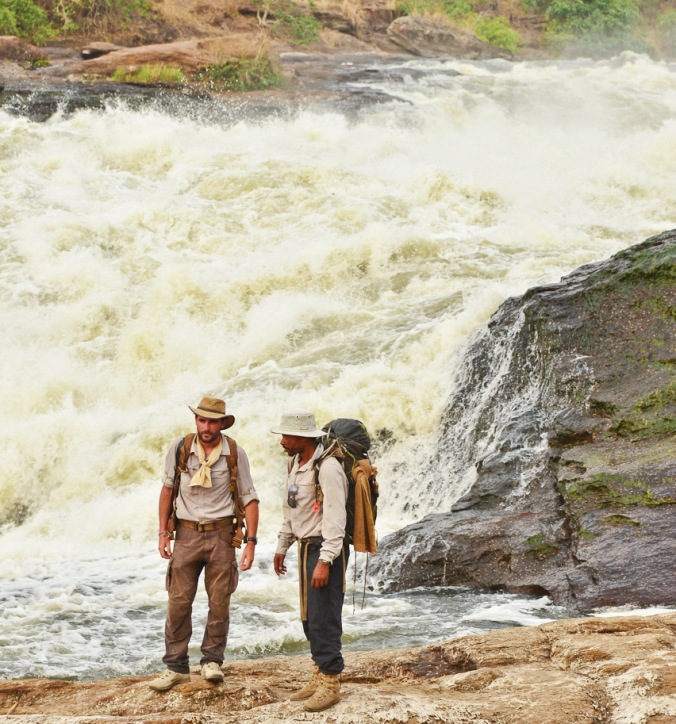

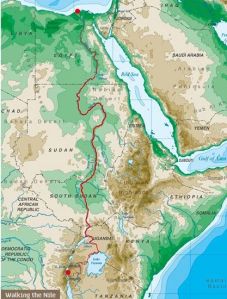
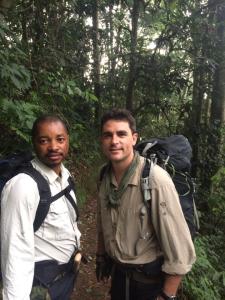
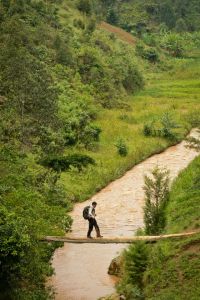
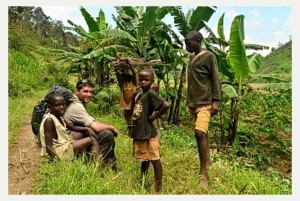


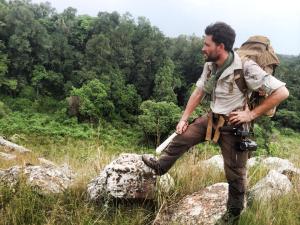

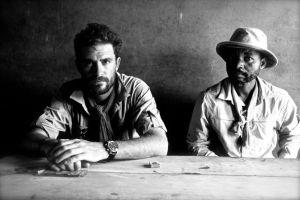

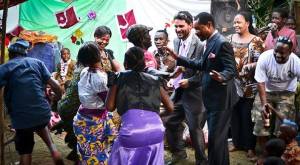
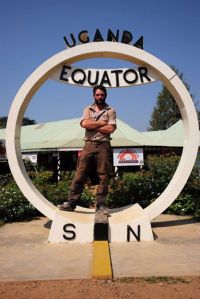
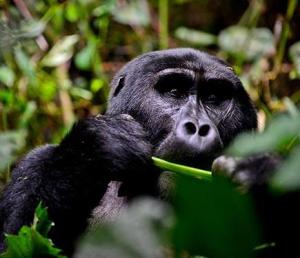

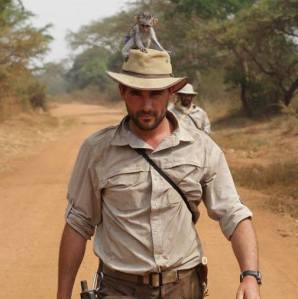




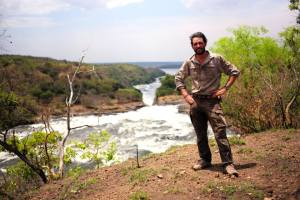
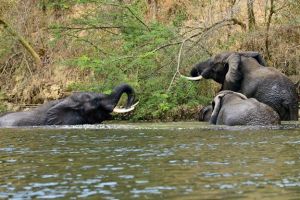

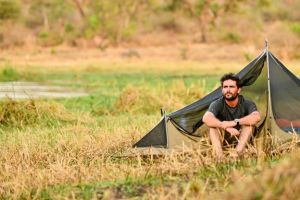
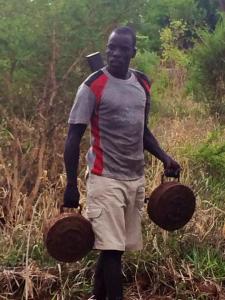
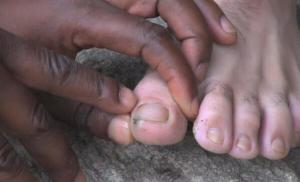
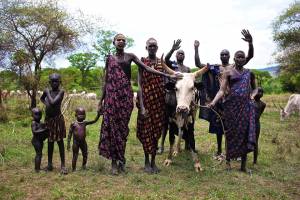


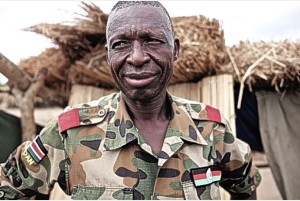

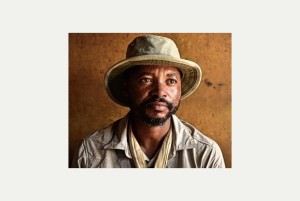
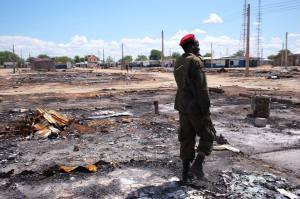
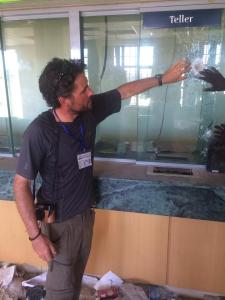
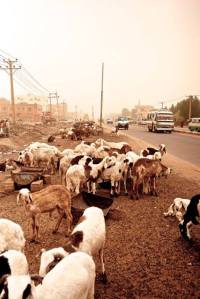





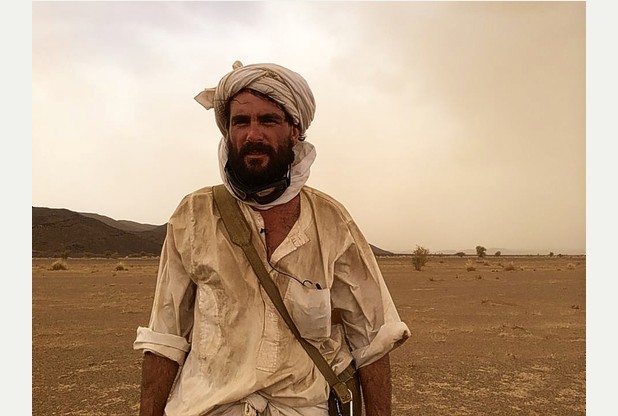
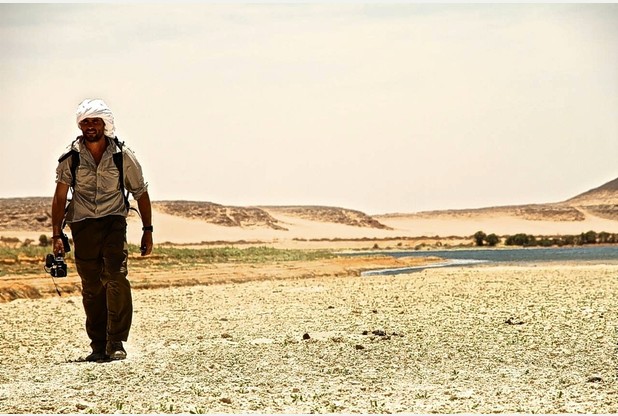












I live in Dallas Texas USA Logged onto Animal Planet one night and saw Walking The Nile with Lev Wood – the very best programme I have seen on TV in years and years. Cannot help but mention that Lev is one handsome and courageous young man. Hope we see more of his expeditions.
Lev, you are one remarkable man,
Thankyou for taking me with you on your Nile Walk, you have absolutely amazing stamina. My love of egypt and the Nile began in Feb 1992 in Luxor when tourism was good, i have enjoyed seeing all the changes to luxor and was last there in Aug 2014 . i have your book, please release on DVD.
Is there any news of little Florence?
Born in Kenya but moved to Australia,South Africa and now live in the UK. Have found your 2 programmes: walking the Nile and now the Himalayas absolutely fascinating (did not fall asleep once!). Depicting local characters and their working lives added to the fascinating journeys and insight into the geographical and political situations was very informative as well as a HUGH visual treat. Thank you for your efforts and determination to bring this into our living rooms at great physical cost to yourself.